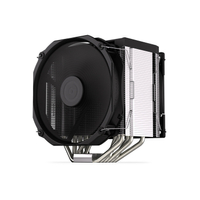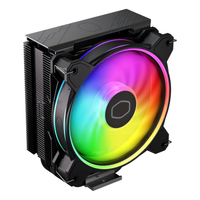Best air cooler for CPUs in 2025: keep your processor chilled with one of these budget-friendly and capable coolers
Quiet, reliable and affordable—why not consider a CPU air cooler in 2025?
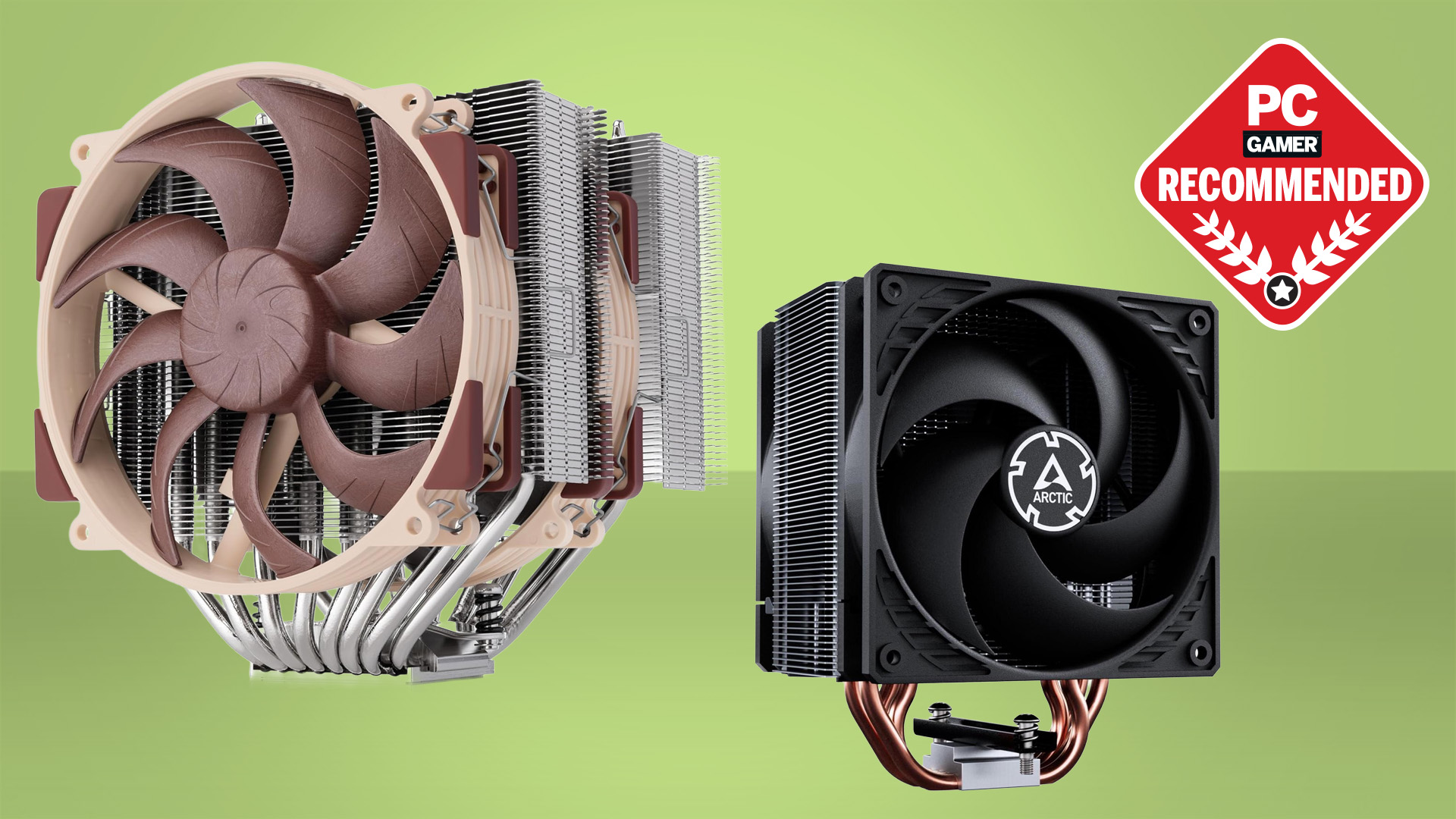
Picking up one of the best air coolers for CPUs is a great way to keep your processor cool while scoring excellent value-for-money. Air coolers are plenty capable next to the best liquid coolers, but importantly they're also quiet and affordable. Take that, liquid cooling.
The best CPU air cooler right now is the Noctua NH-D15 G2. This capable cooler keeps up with liquid coolers thanks to two large heatsinks and two of Noctua's latest and greatest fans. It's a lump, but it's a cool lump.
For those looking to save some money, the best budget air cooler is the Arctic Freezer 36. It's more of your traditional air cooler with an aluminum heatsink and visibly copper heatpipes, but it gets the job done for very little cash. Also it does come in black.
June 11, 2025: Updated to add a new best budget air cooler, the fantastic Arctic Freezer 36, and to include the tempting Cooler Master Hyper 612 Apex as the best looking air cooler. Also some smaller tweaks and updated information throughout.
March 10, 2025: Updated to add a section to display our air cooler test results and list our test bench specs, as well as check all our recommendations still represent the best air coolers on the market (they do!).

Jacob has set-up a test rig for testing CPU coolers at home—that's how dedicated he is to the task of finding the best available. It's also quite useful to have a bunch of fans around during the summer. Anyways... With eight years of experience, he's dealt with the chilliest coolers and those that were, quite literally, too hot to handle.
The quick list
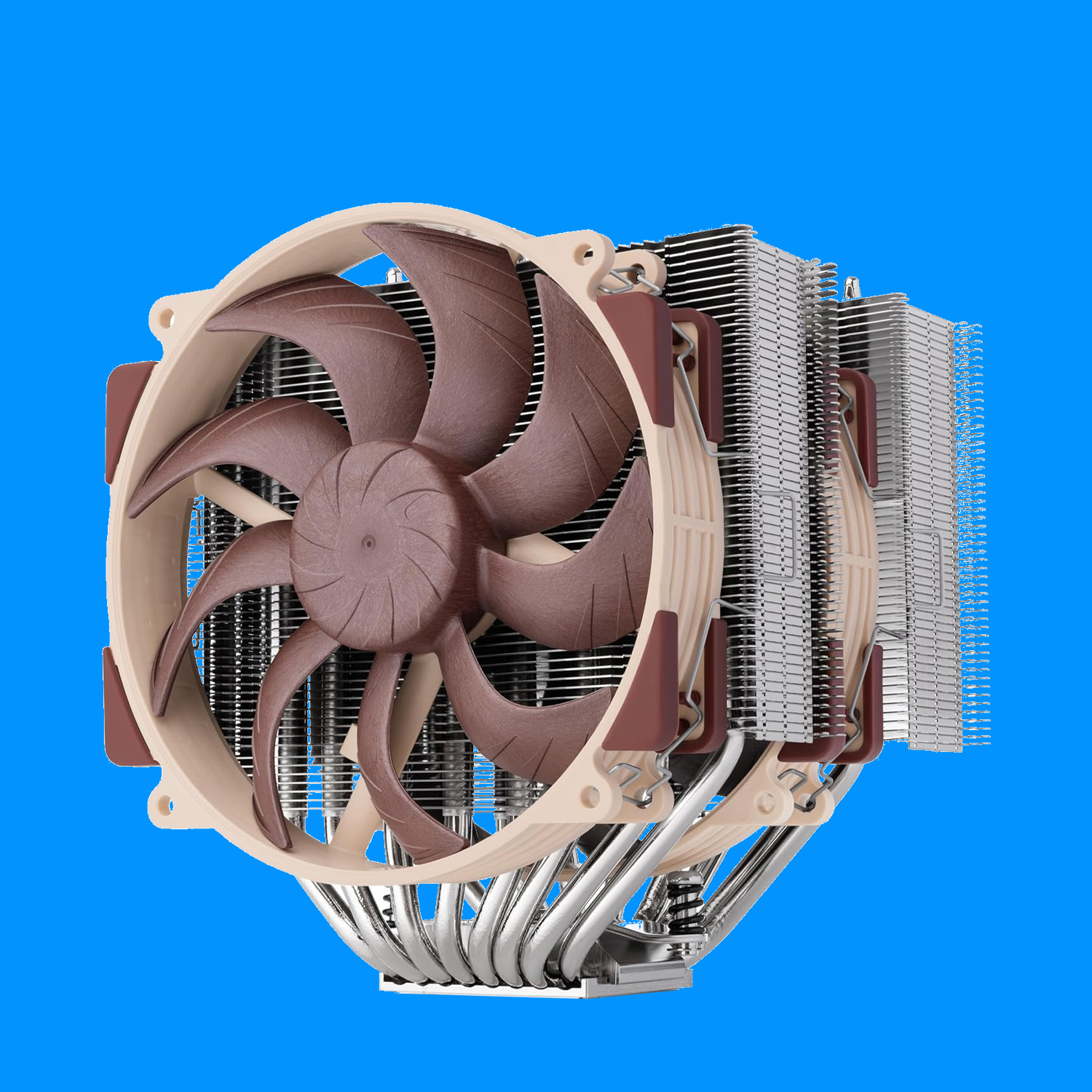
The best overall
For top-tier chip chilling, look no further than Noctua's latest and greatest, the NH-D15 G2. It's liquid cooling level. The cooler is a chunky unit, but even the fans took nearly a decade to develop.
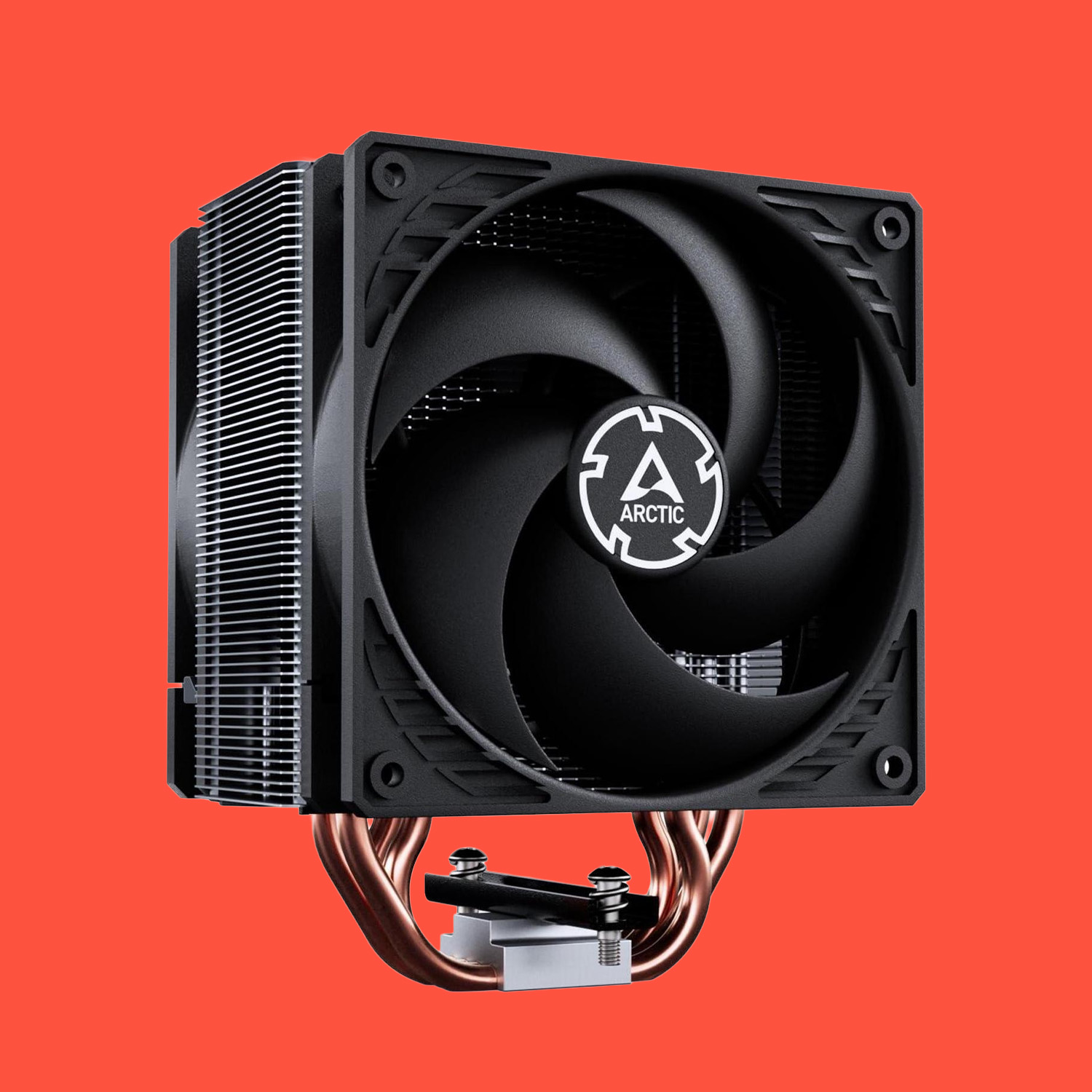
The best budget
If you want to save some cash, or even if you don't, the Arctic Freezer 36 is the air cooler for you. It's more or less all you need in an air cooler, with excellent performance and a low price tag.
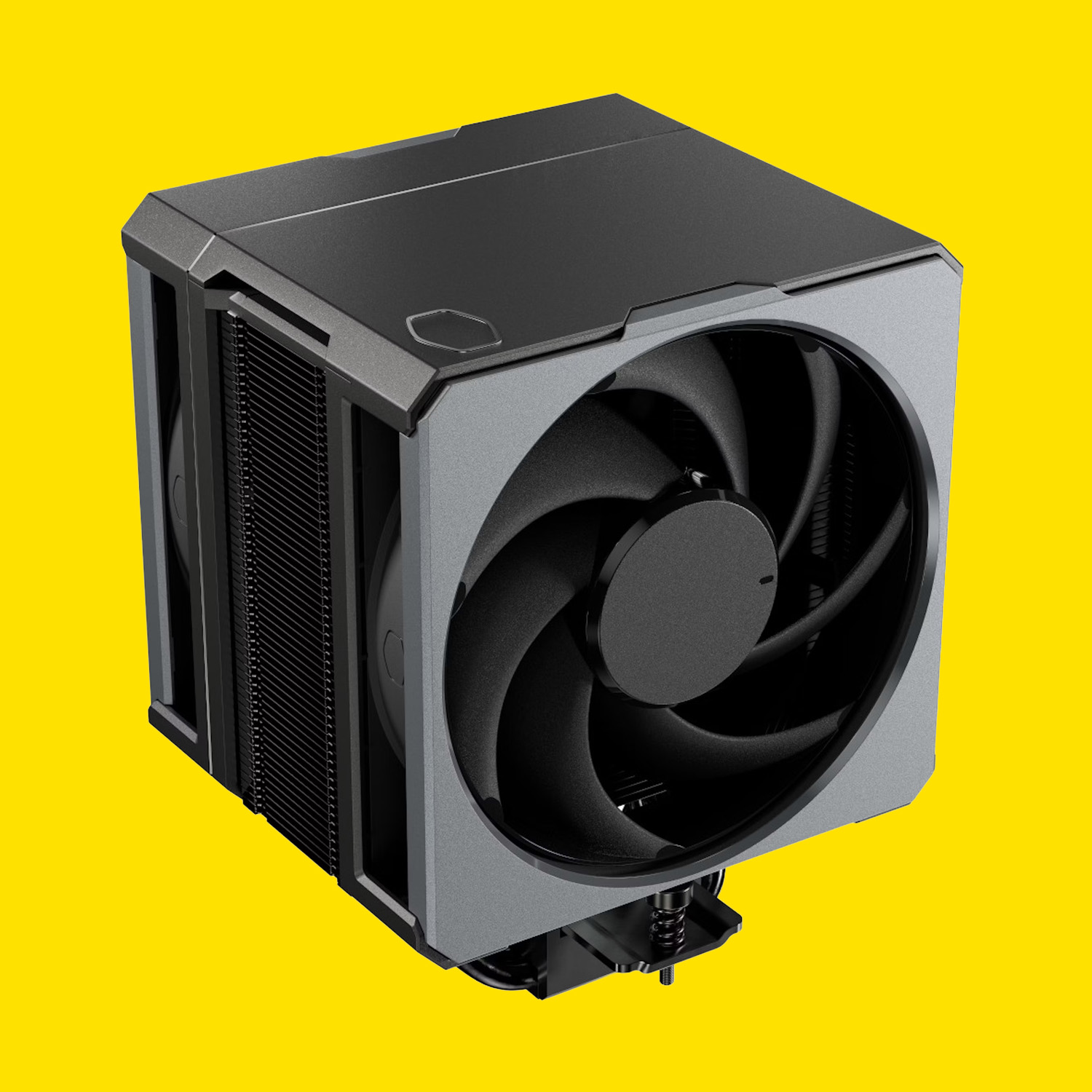
The best looking
The Cooler Master Hyper 612 Apex is a really stunning cooler. It's not stealthy by any means, but it looks superb through a tempered glass side panel.
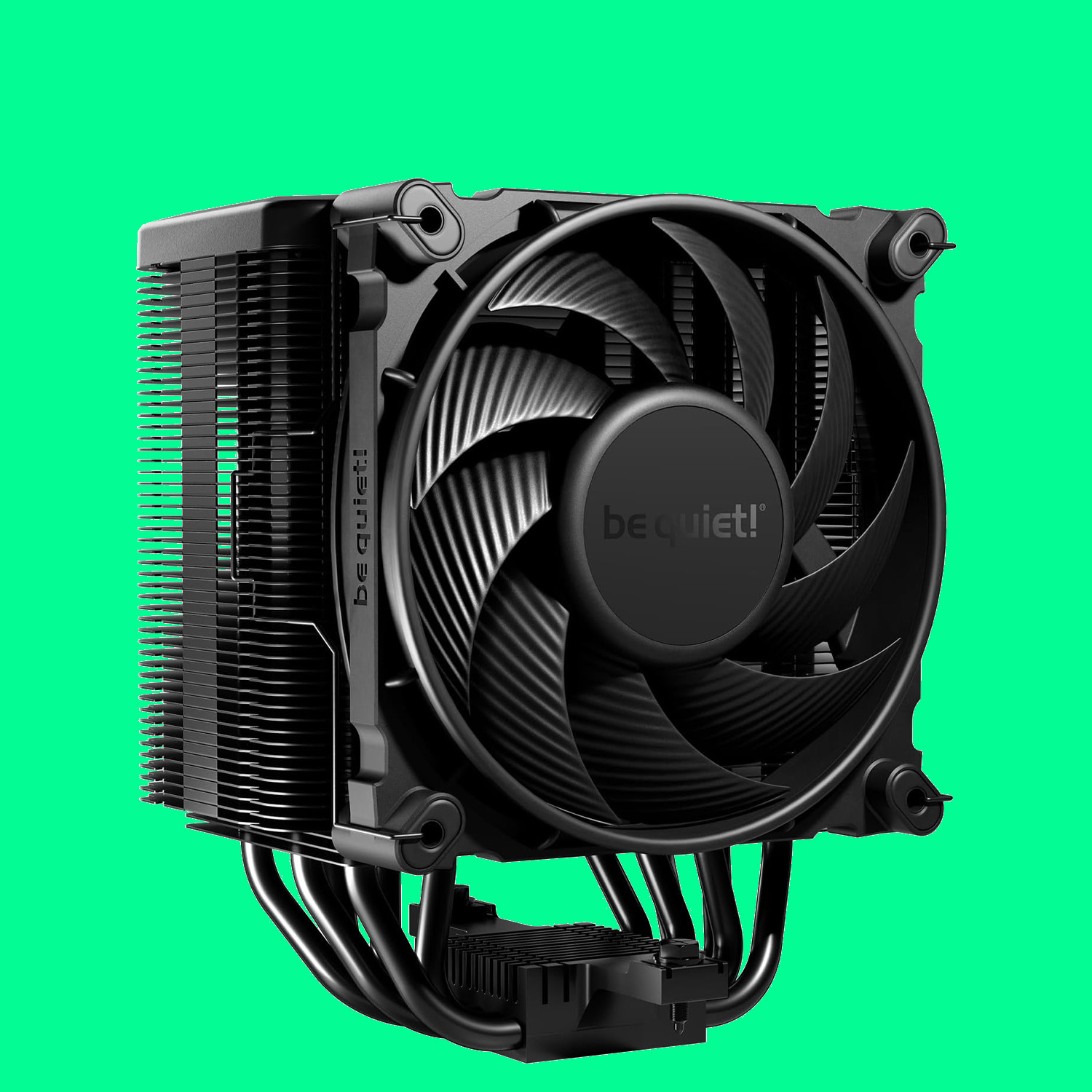
The best quiet
Don't want to spend too much but also afraid you'll be left wanting by something cheaper? This Be Quiet! Dark Rock 5 is a good-looking, solid performer with a quiet operation.
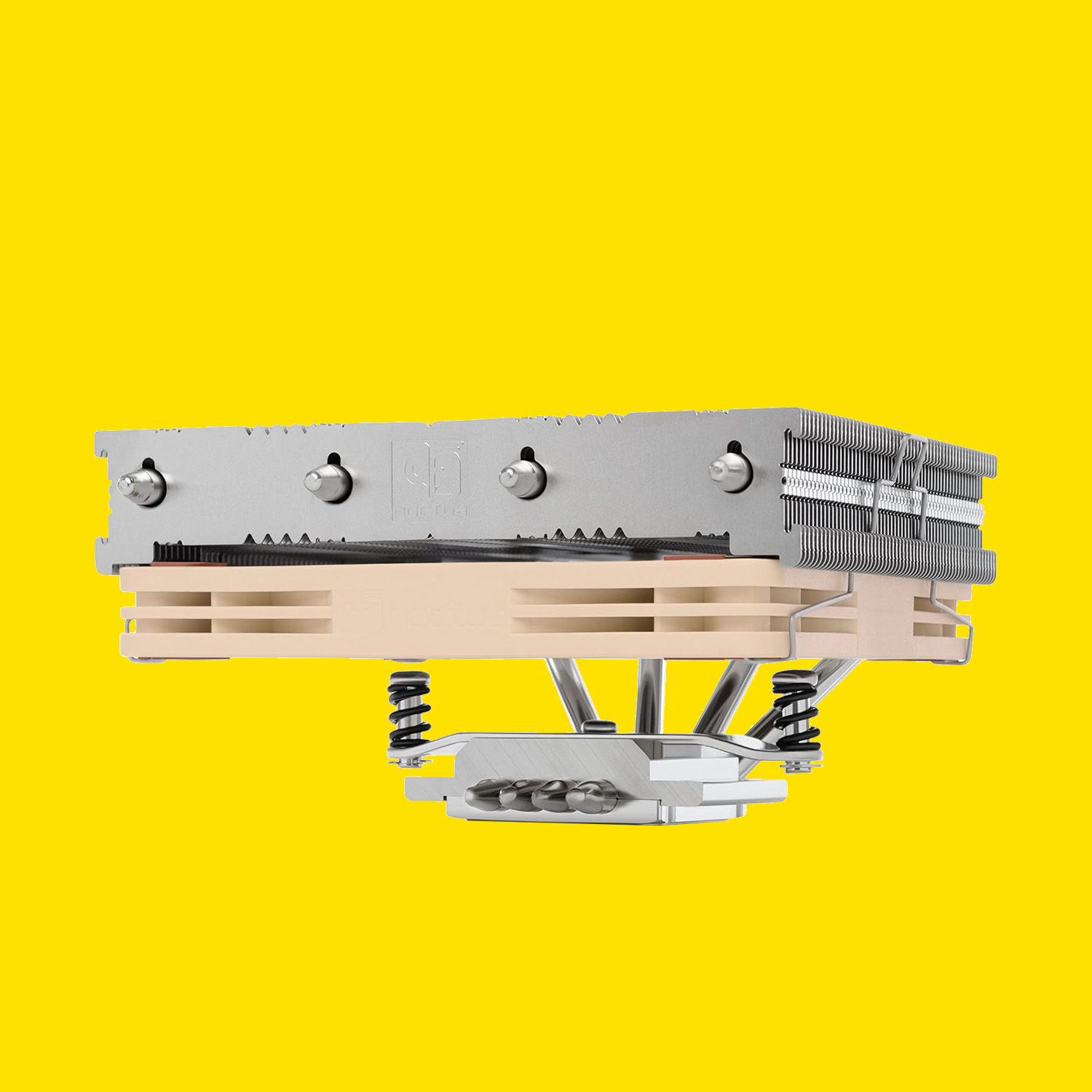
The best low-profile
For Mini-ITX or small form factor builds, the Noctua NH-L12S is a great fit. Literally. It will fit in almost any cramped spot thanks to a clever design where the fan slots in between the heatsink and coldplate.
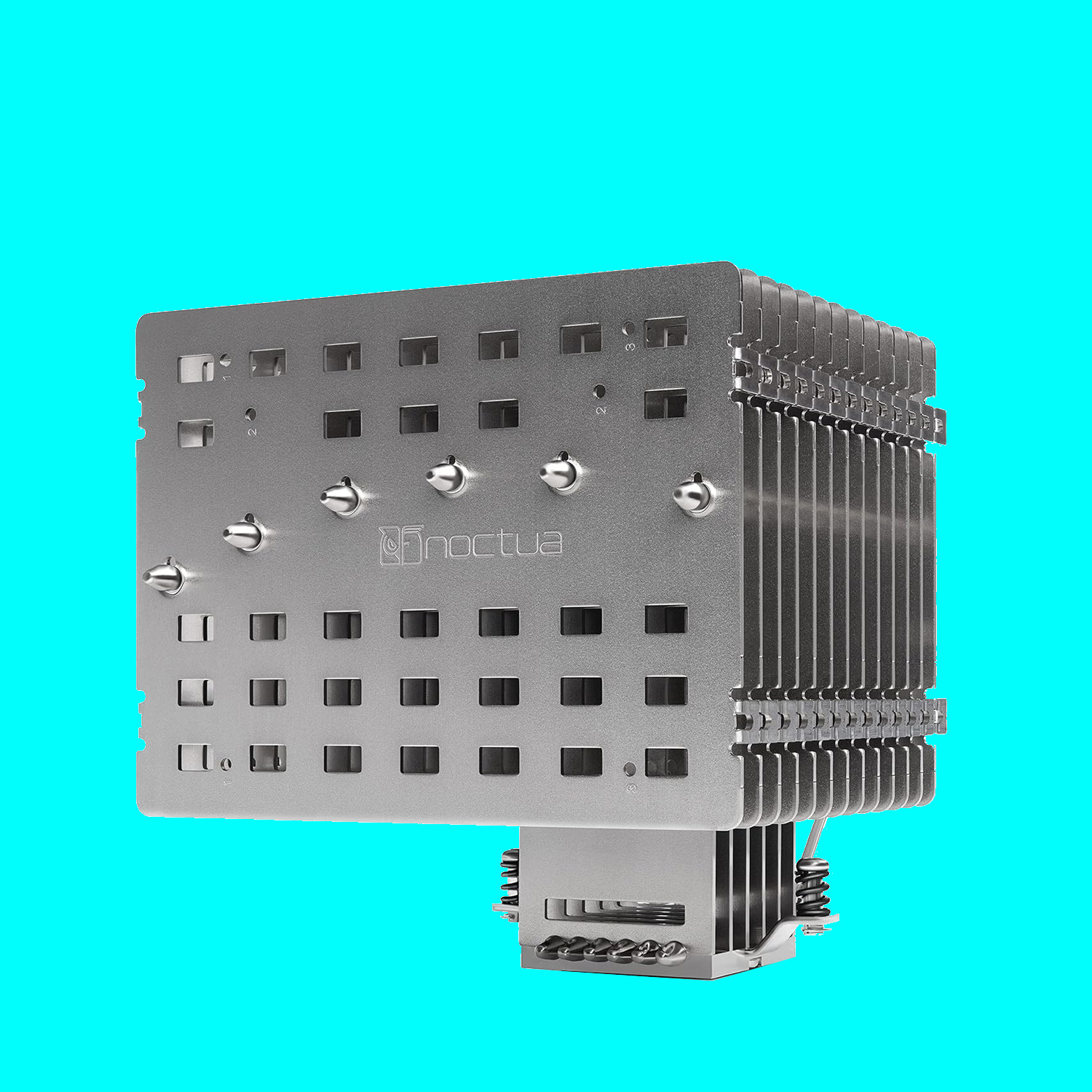
The best passive
A niche product but an important one. If you really must have no noise, no fans, and no moving parts in your PC, this is the way to go. You have to be careful which CPU you pair with it, but it does a stupendous job even sans fans.
The best air cooler for CPUs
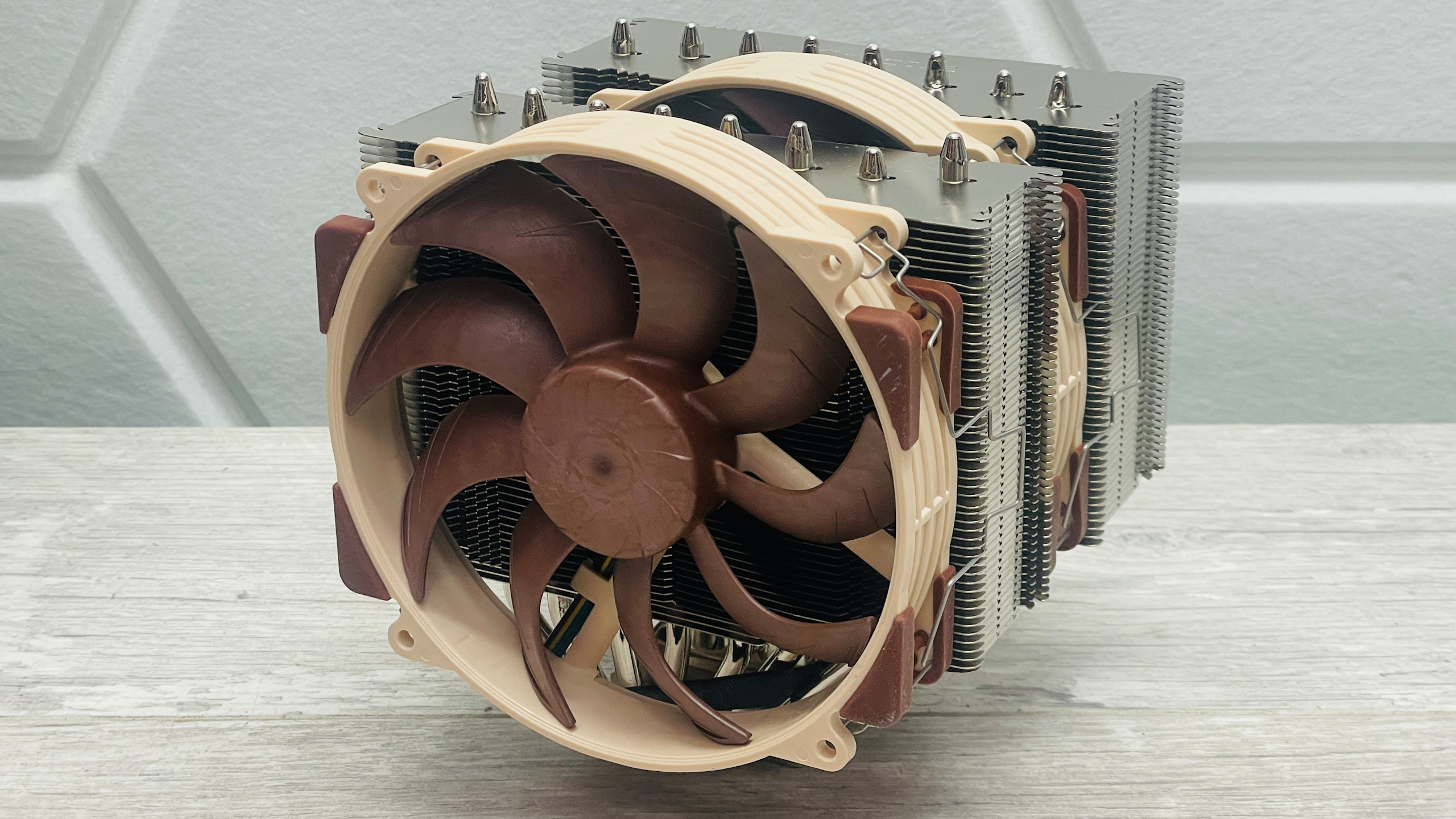
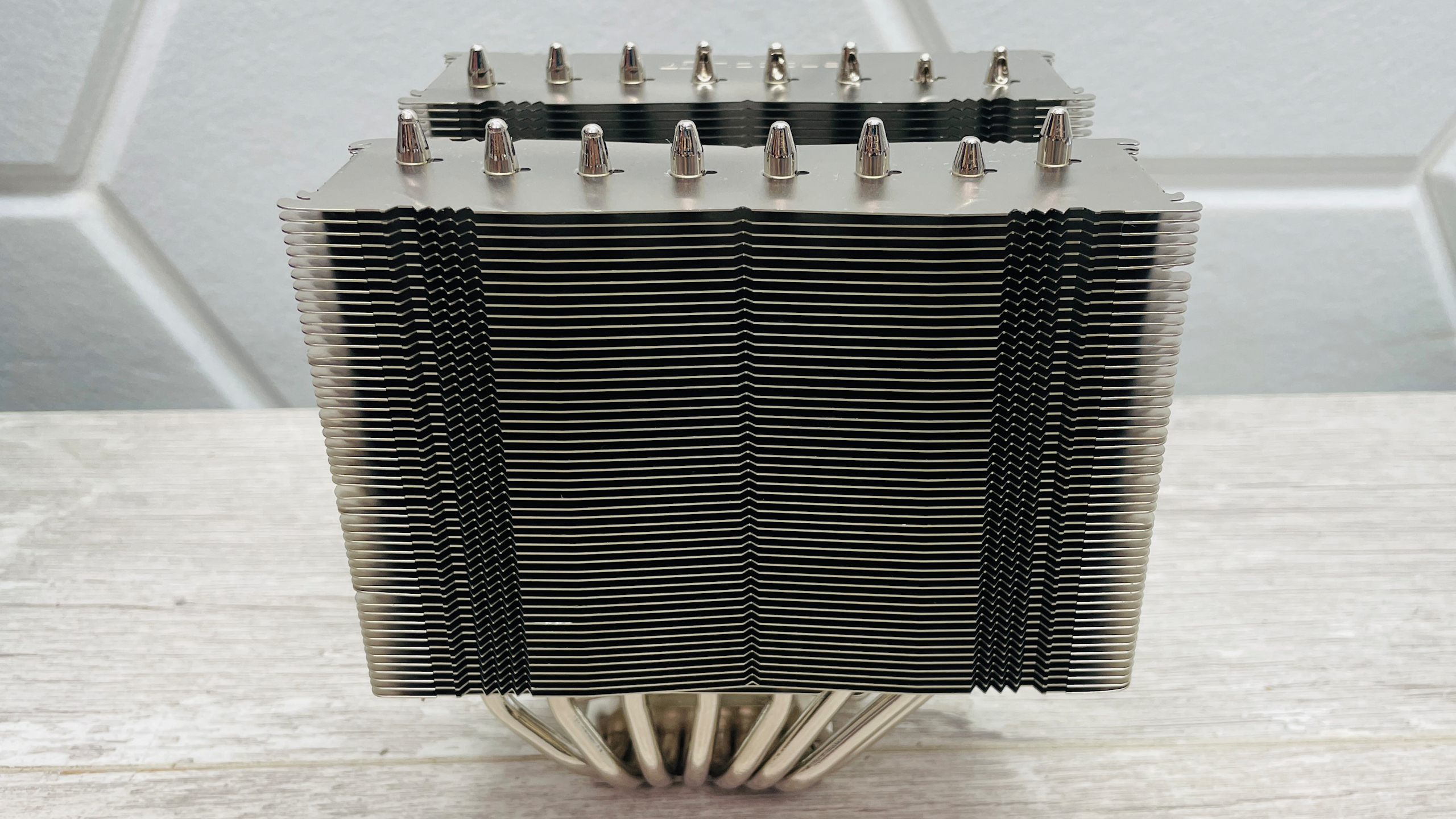
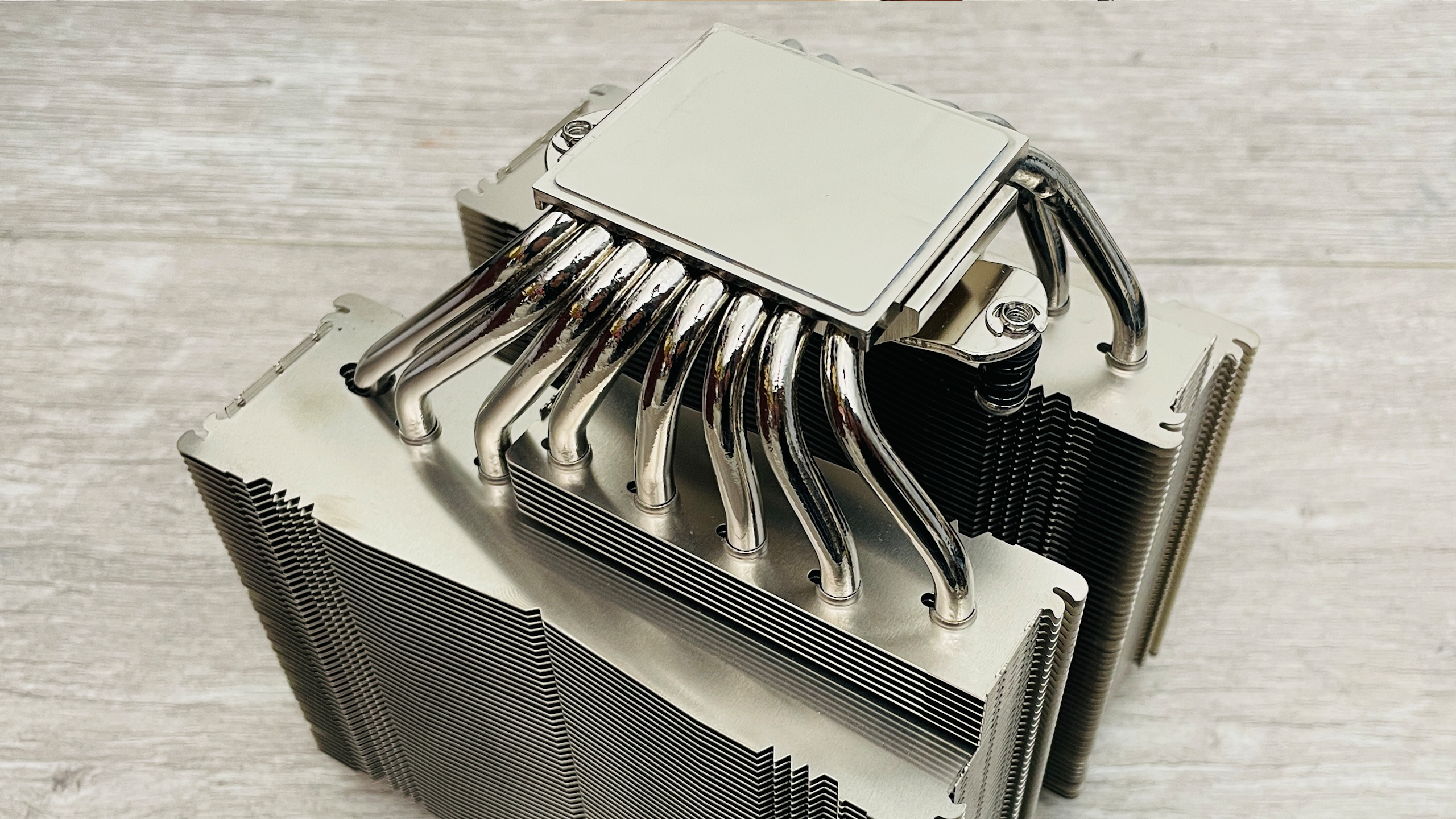
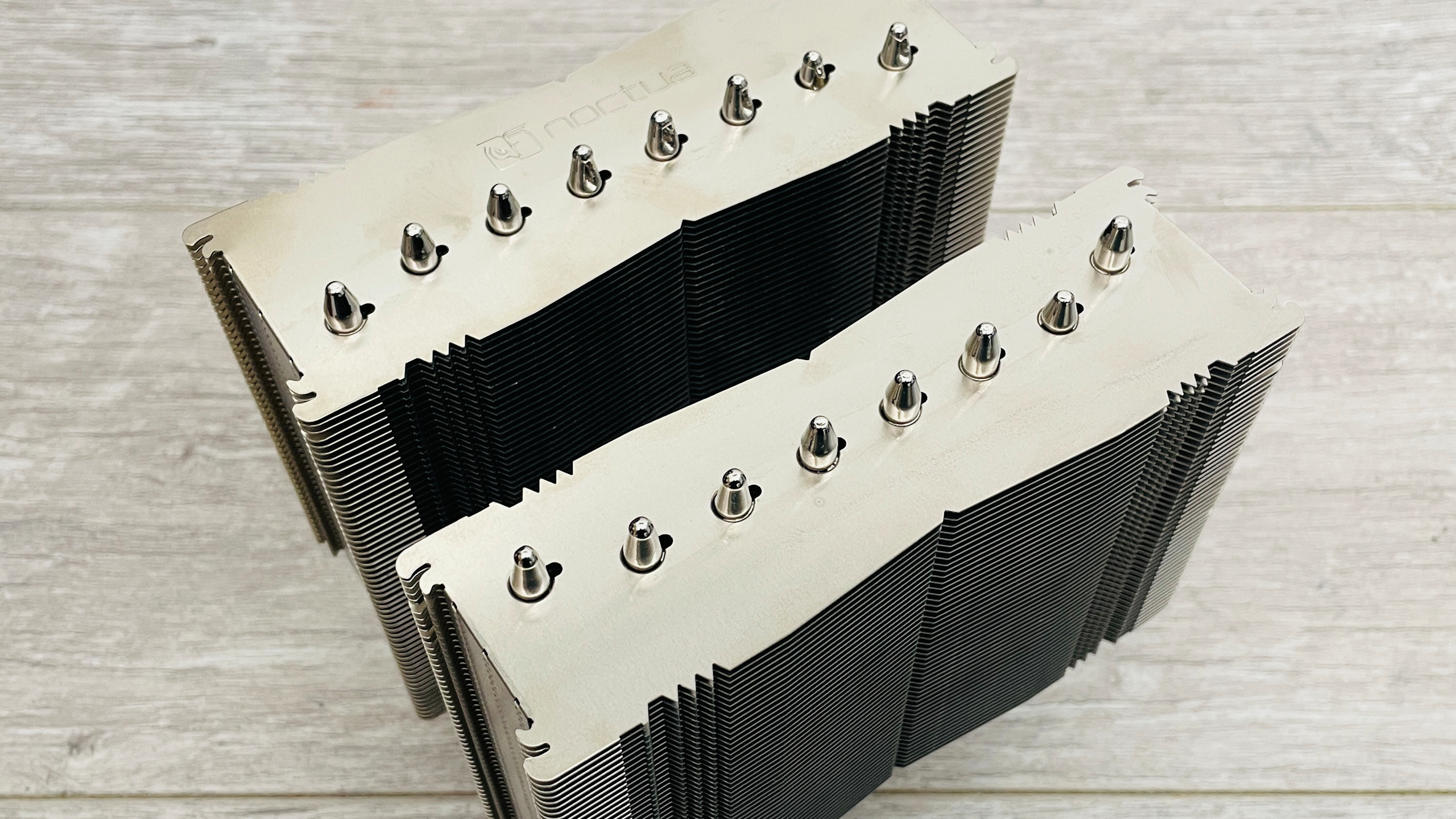
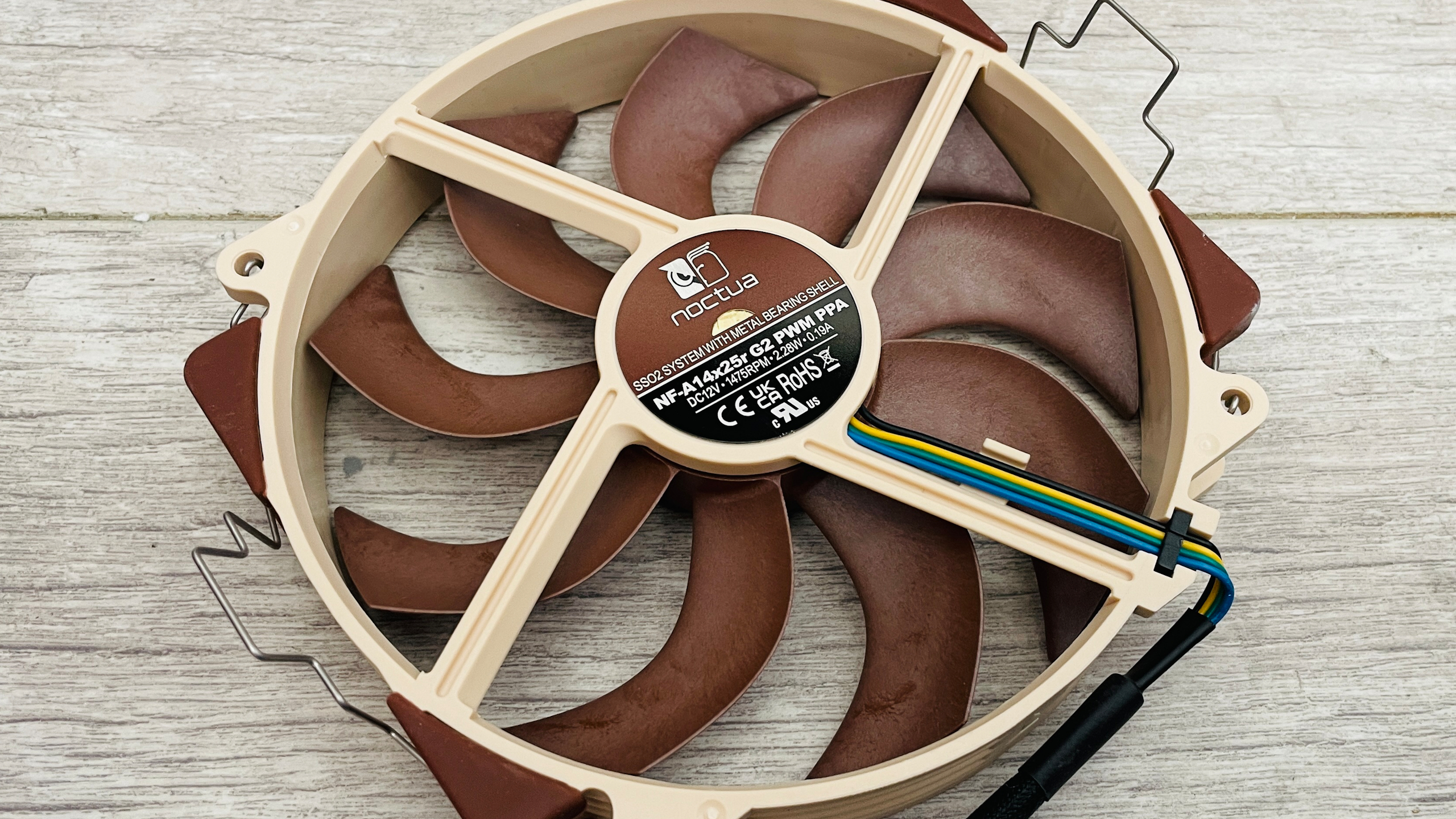
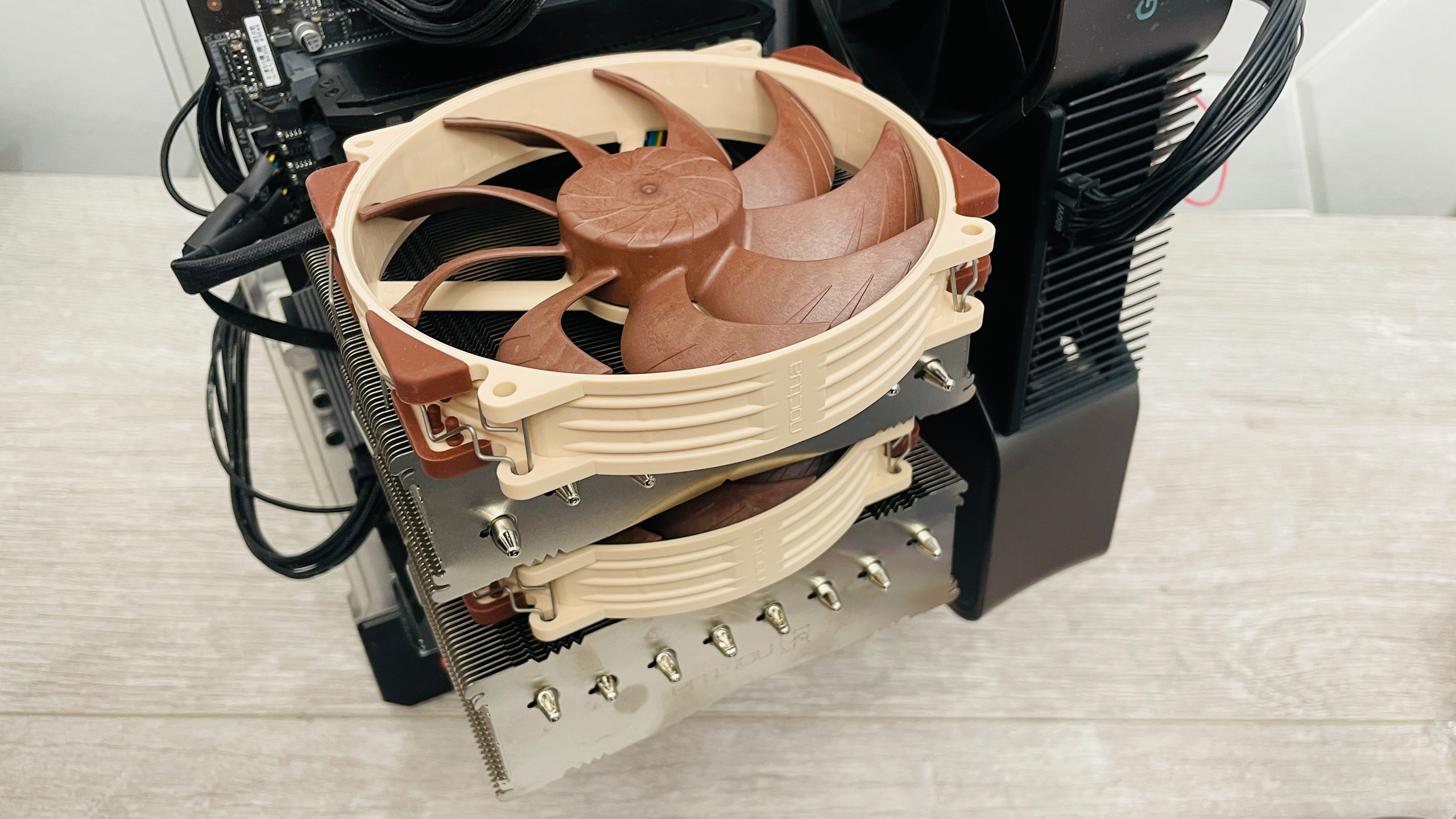
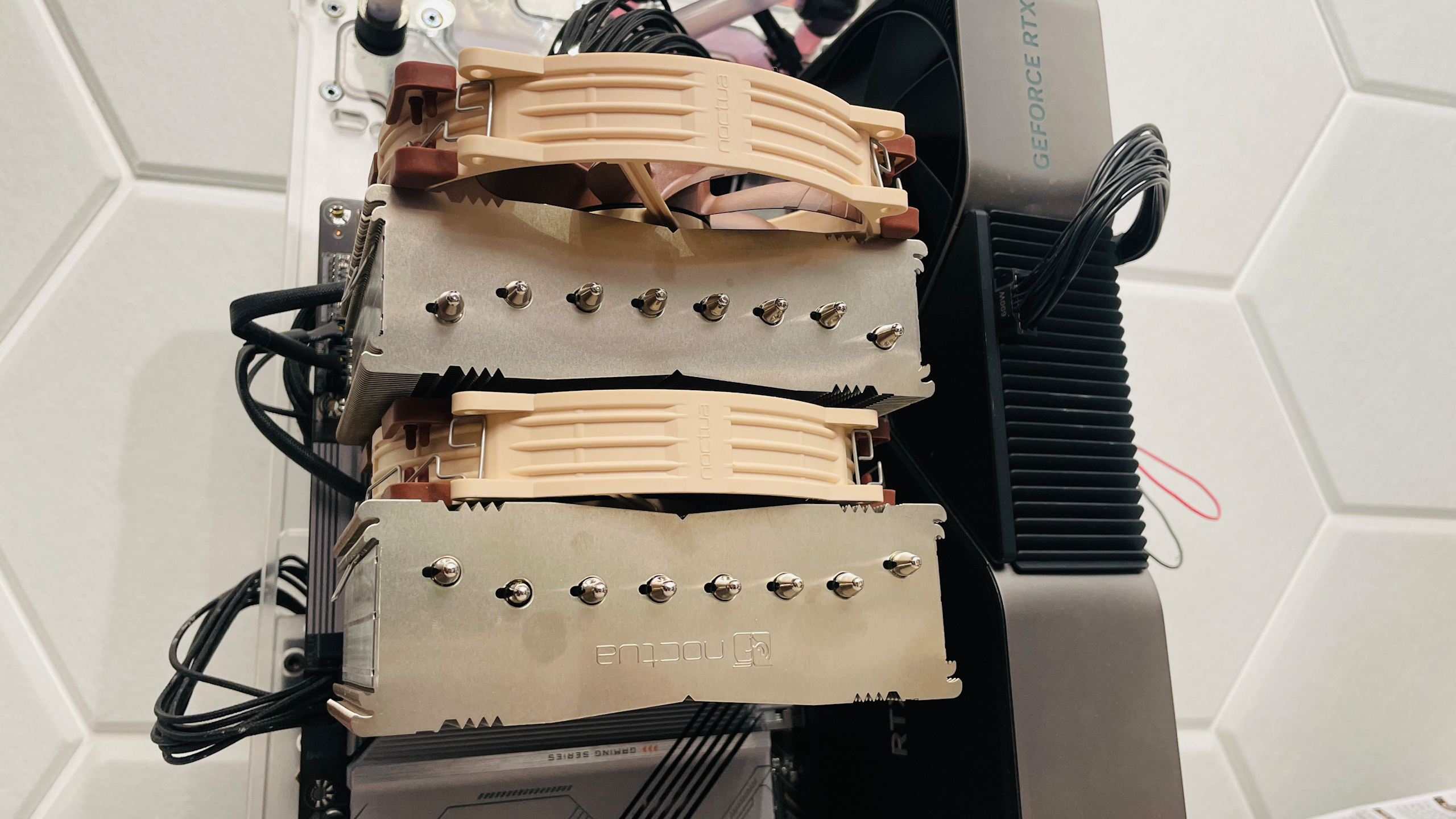
Specifications
Reasons to buy
Reasons to avoid
✅ You need top-tier cooling without liquid: This is about as good as air cooling gets, at least outside of server parts.
✅ You want low-noise, high-reliability: Air cooling is best for both of these things versus an AIO liquid cooler, but the Noctua NH-D15 G2 is especially good for both.
❌ You have a small case or tall memory: The NH-D15 G2 is lots of things, but small isn't one of them.
The best air cooler for a CPU in 2025 is the Noctua NH-D15 G2. It combines loads of heatpipes with excellent fans and the latest design to optimise performance and minimise noise. What more could you ask for? Smaller? Er, better scroll on for that.
A dual-tower, dual-fan cooler with the ability to keep even some of the most demanding CPUs chilly—Noctua hasn't left anything on the table with this impressive, and impressively huge, cooler.
Noctua spent nearly a decade developing just the fan included on the NH-D15 G2. Yep, it was being developed internally for an age before we heard about it, and then I spent another couple years patiently waiting for it. Well, now the 140 mm version, the NF-A14x25r G2 PWM, is here and it's excellent for the energy spent on designing it.
You get two of Noctua's latest and greatest fan included with the NH-D15 G2. Both in a round configuration, which means they're best suited to air coolers rather than acting case fans. They're set-up in a novel way—the fans rotate at ever-so-slightly differing speeds to prevent the two fans matching each other's vibes and making more noise—that's the technical way of describing what's going on, anyways.
The NH-D15 G2 is available in three variants: standard, LBC and HBC.
Standard is, well, just your average air cooler with your average coldplate convexity to make good contact with your CPU's integrated heatspreader (IHS).
LBC is made especially for low convexity processors. Think AMD's top AM5 chips or custom lapped chips—if the top of your processor is nice and level, this might outperform the standard model.
HBC is made with a higher convexity coldplate, for troublesome LGA1700 processors. These chips were too long for their own good, and without any washers added to the motherboard, would often bend a little in use. Once bent, a chip would make worse contact with a cooler and may end up with higher temps.
To be honest, both HBC and LBC designs are pretty niche, as if you really want the very best cooling potential, you'll probably want to buy one of the best liquid coolers instead. However, our Core i7 14700K test bench did see slightly better temps at times with the HBC model. Only a little, though, and not all the time. That suggests any benefit is pretty minimal, but a CPU's particular bend might mean the results vary.
But enough about bendy chips, this cooler performed exceptionally well in testing. While gaming, it is capable of matching a 360 mm liquid cooler, though it does get overwhelmed in more CPU-intensive workloads, such as Cinebench R23.
Still, an air cooler than can compete with a massive liquid cooler is impressive. Though this cooler does cost as much as some 360 mm AIO coolers.
The Noctua is worth it if you're chasing silence, though. It doesn't make much noise most of the time, and even at high speeds it's pretty easygoing on the ears. It also has the benefit of longevity—with a little care, only the fans will ever wear out, and those have an extraordinarily long lifetime and six-year warranty.
Read our full Noctua NH-D15 G2 review.
The best budget air cooler for CPUs
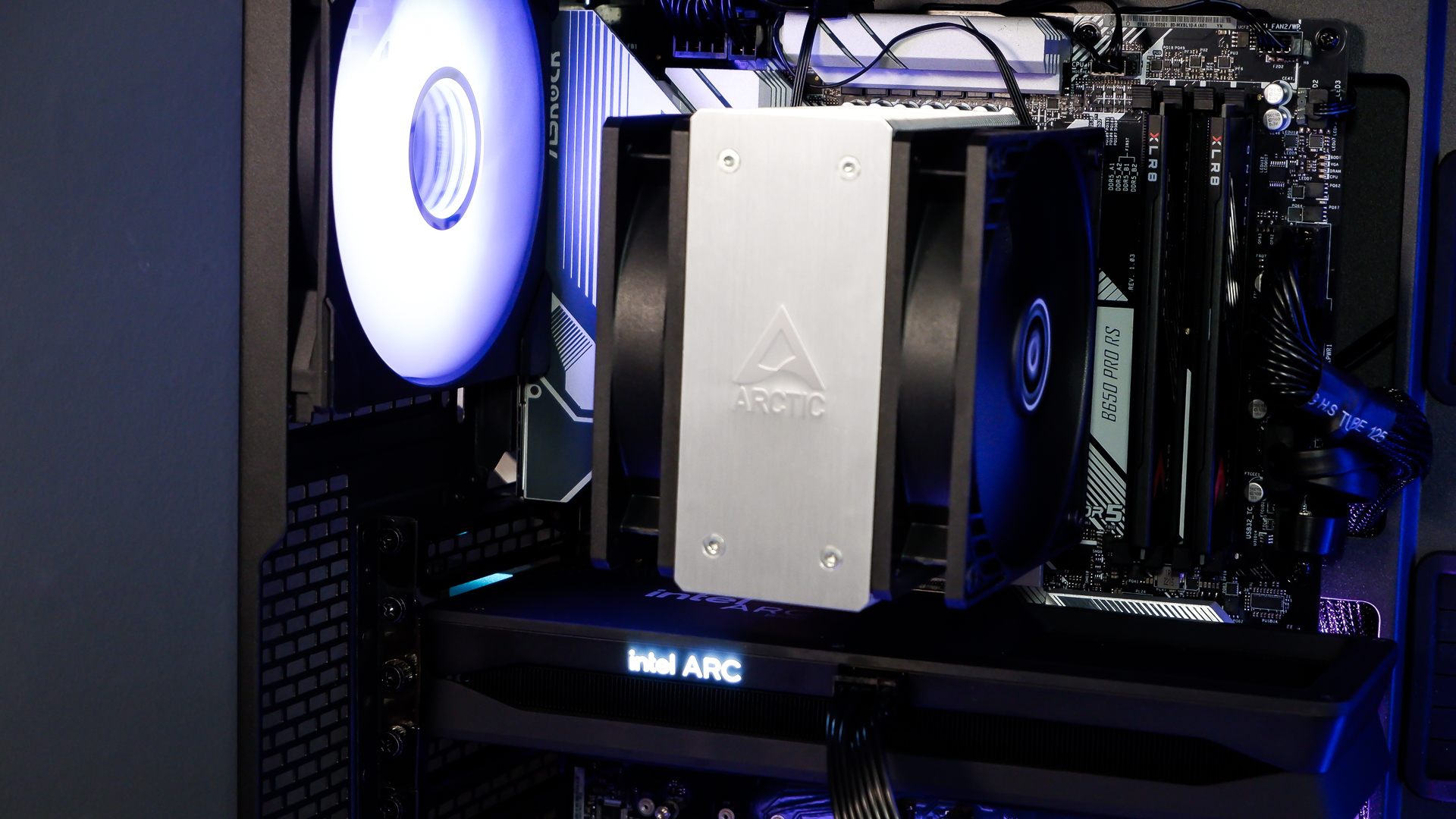
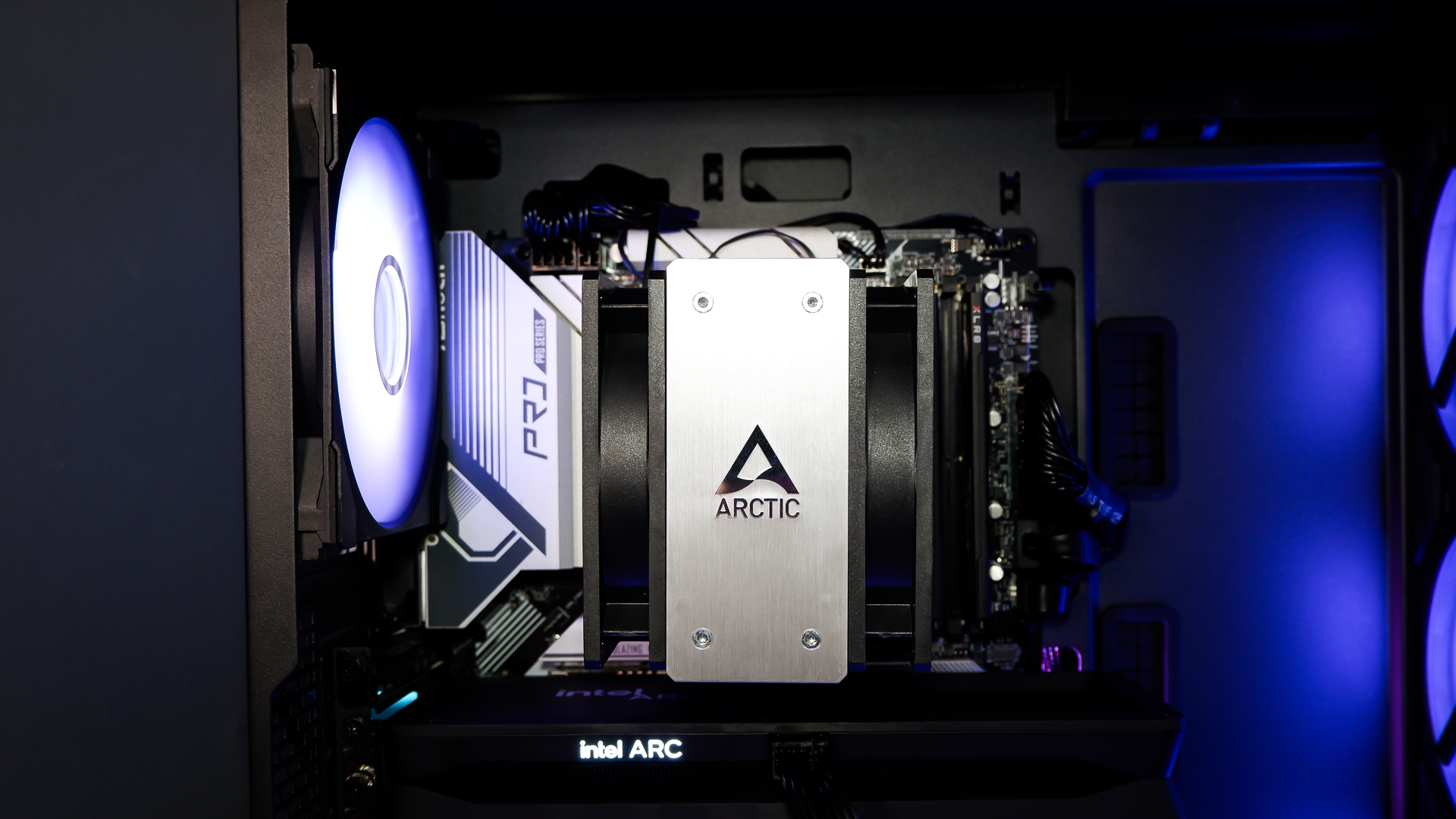
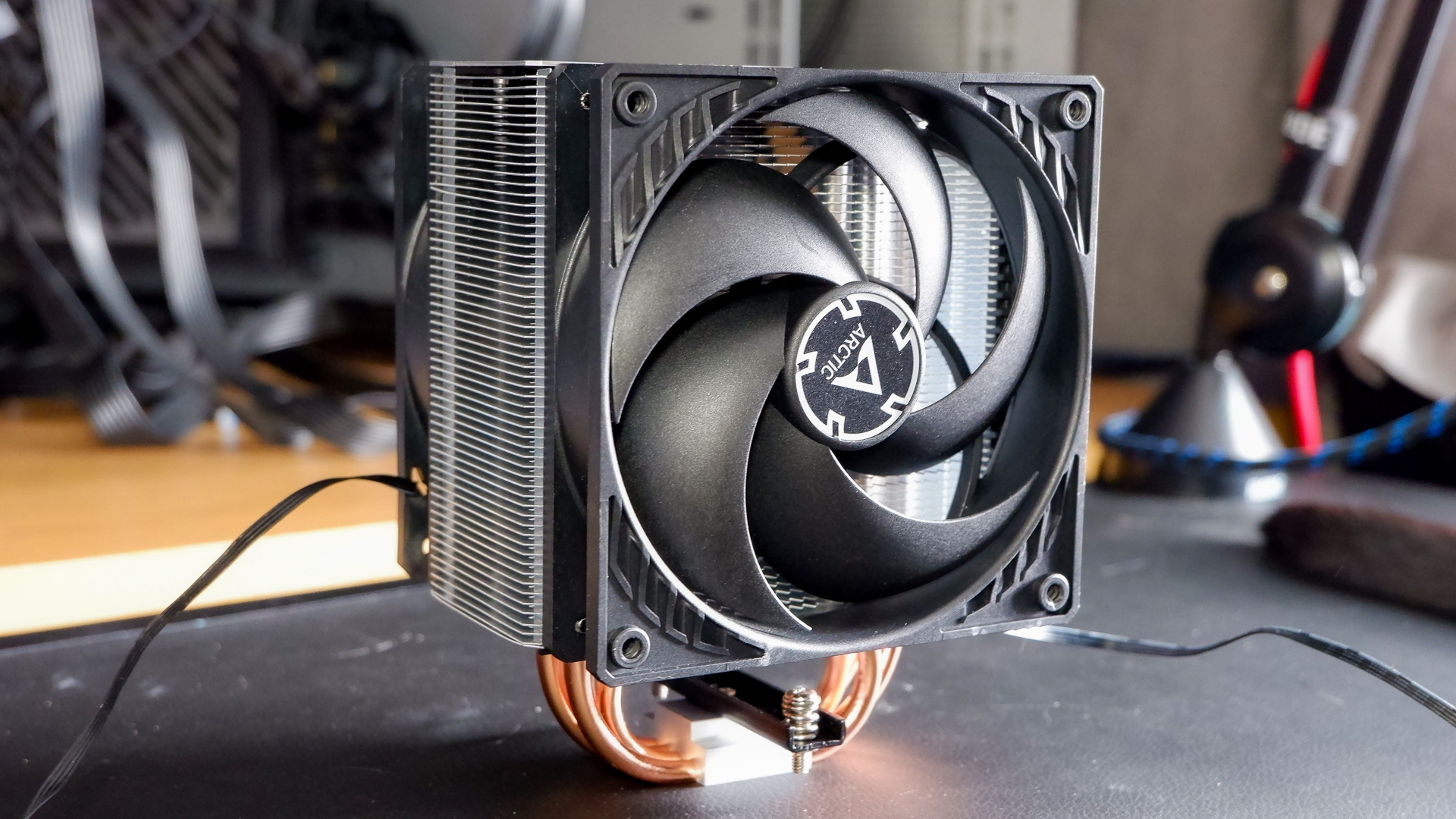
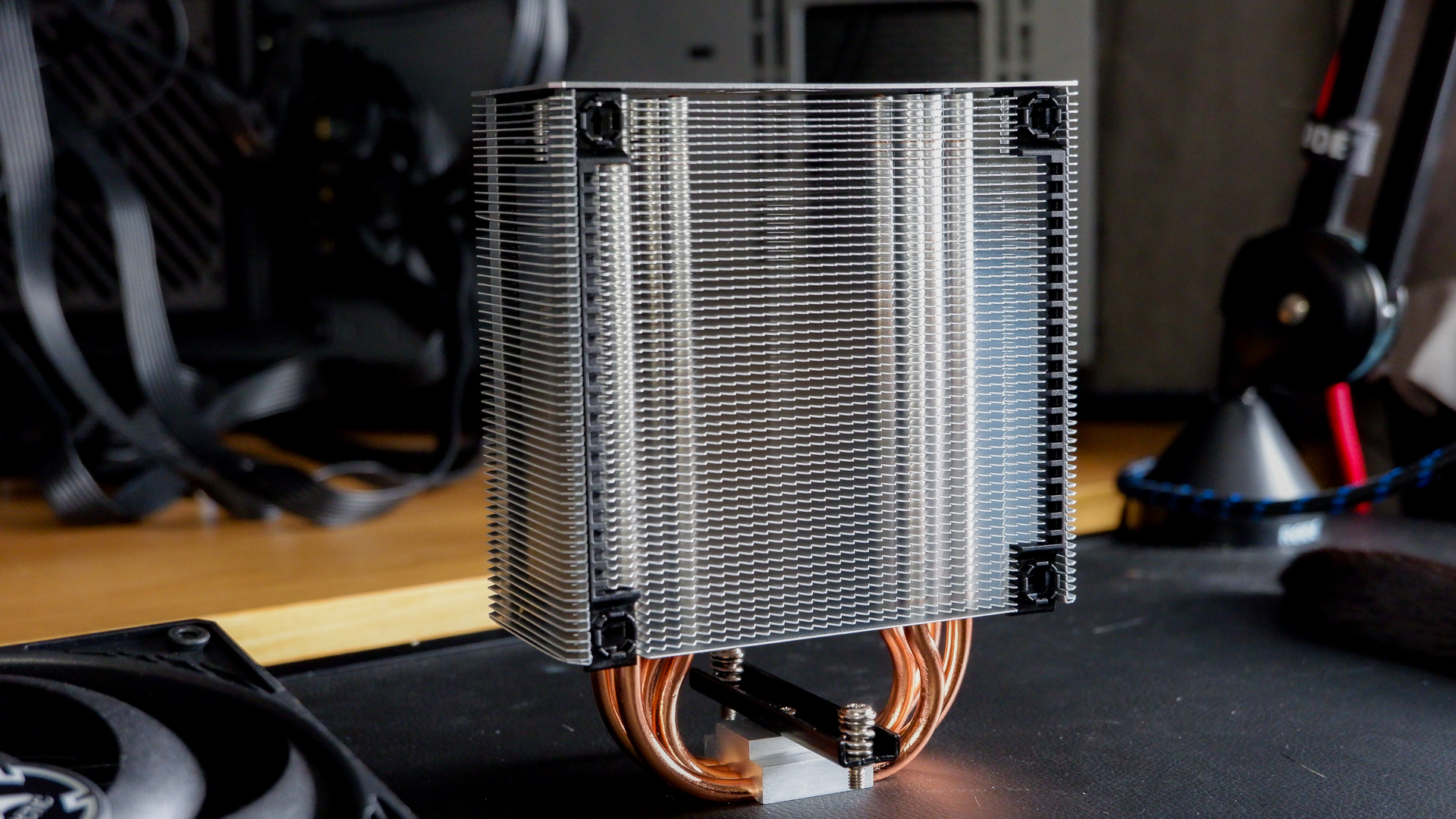
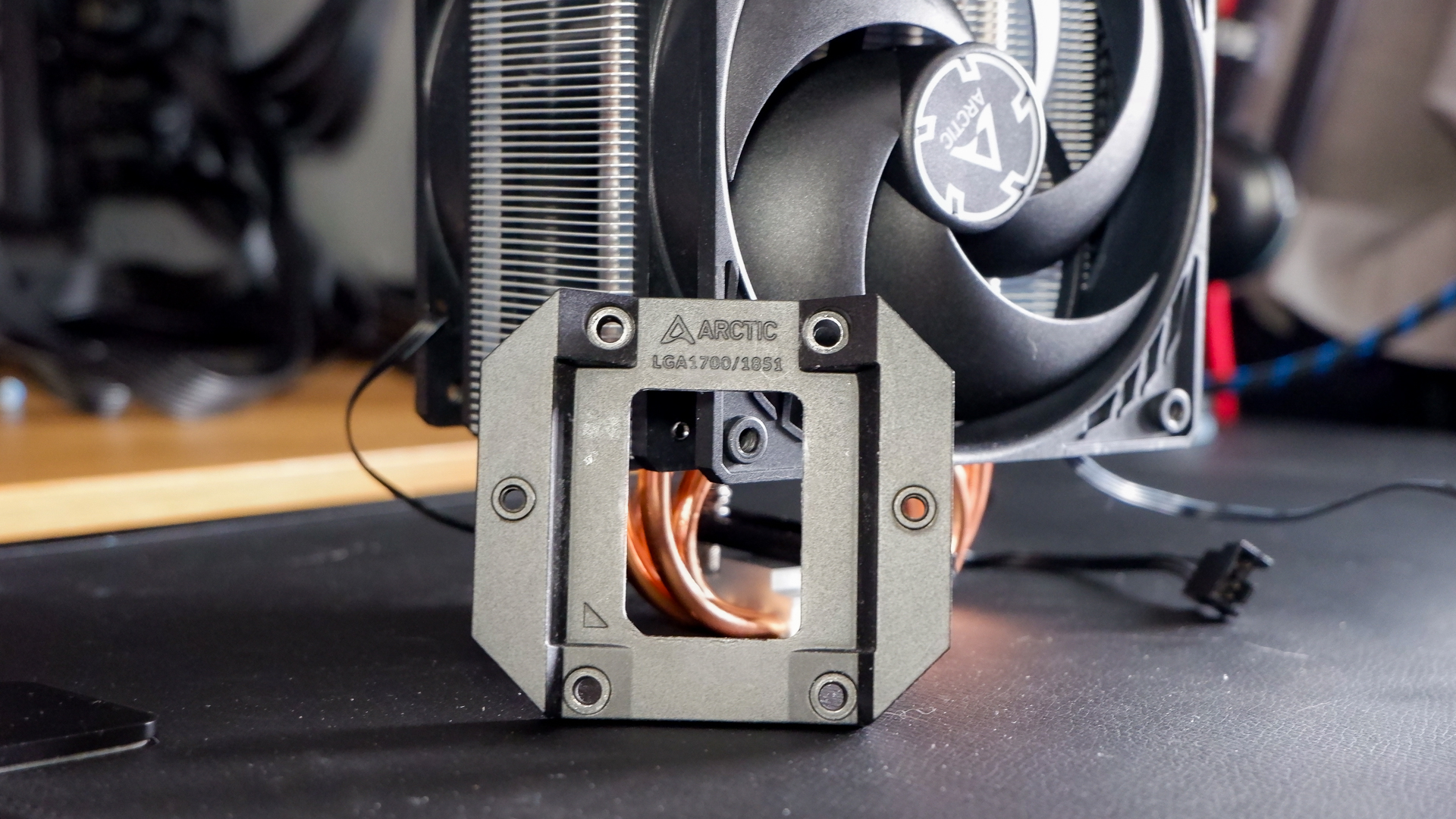
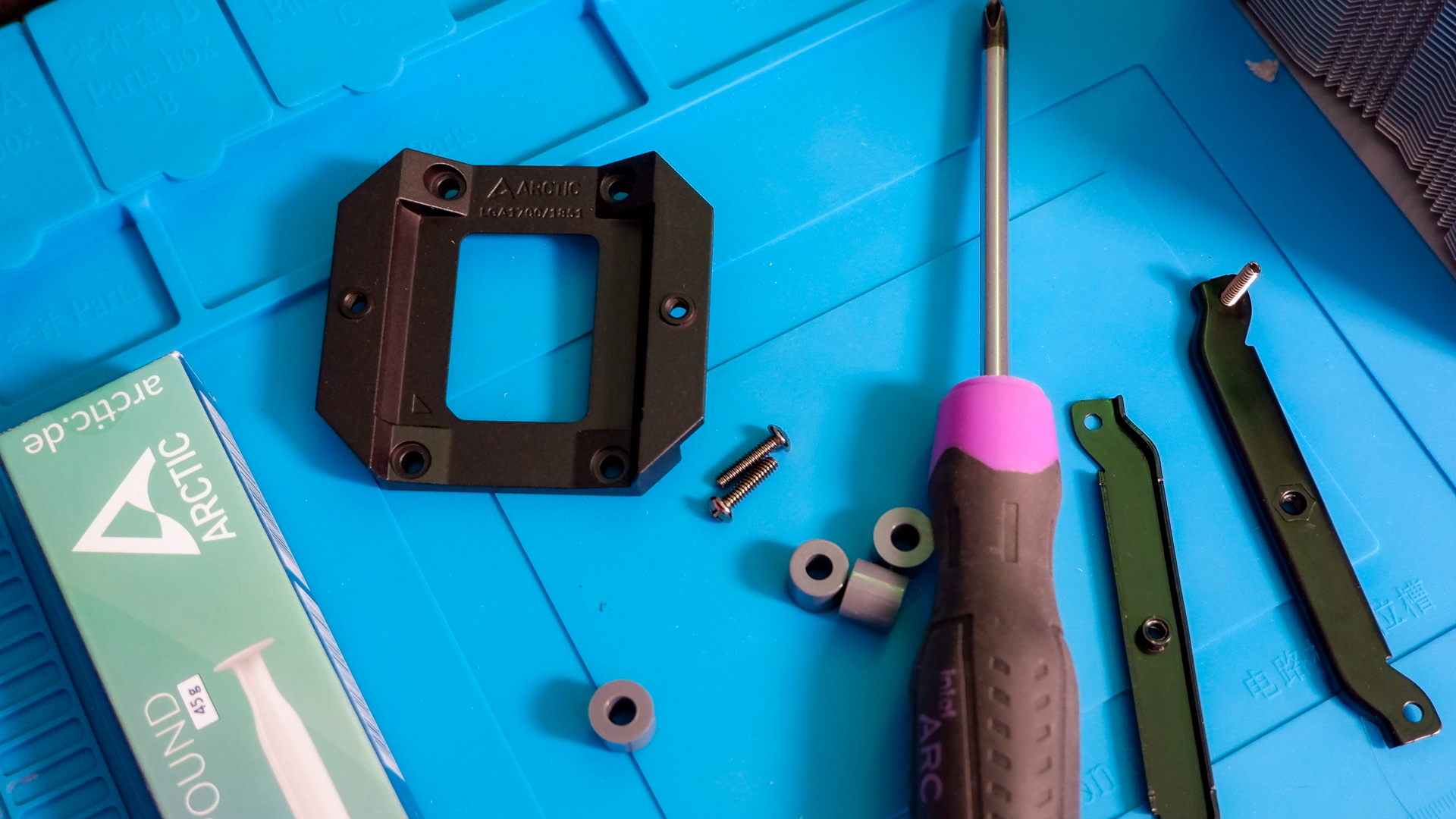
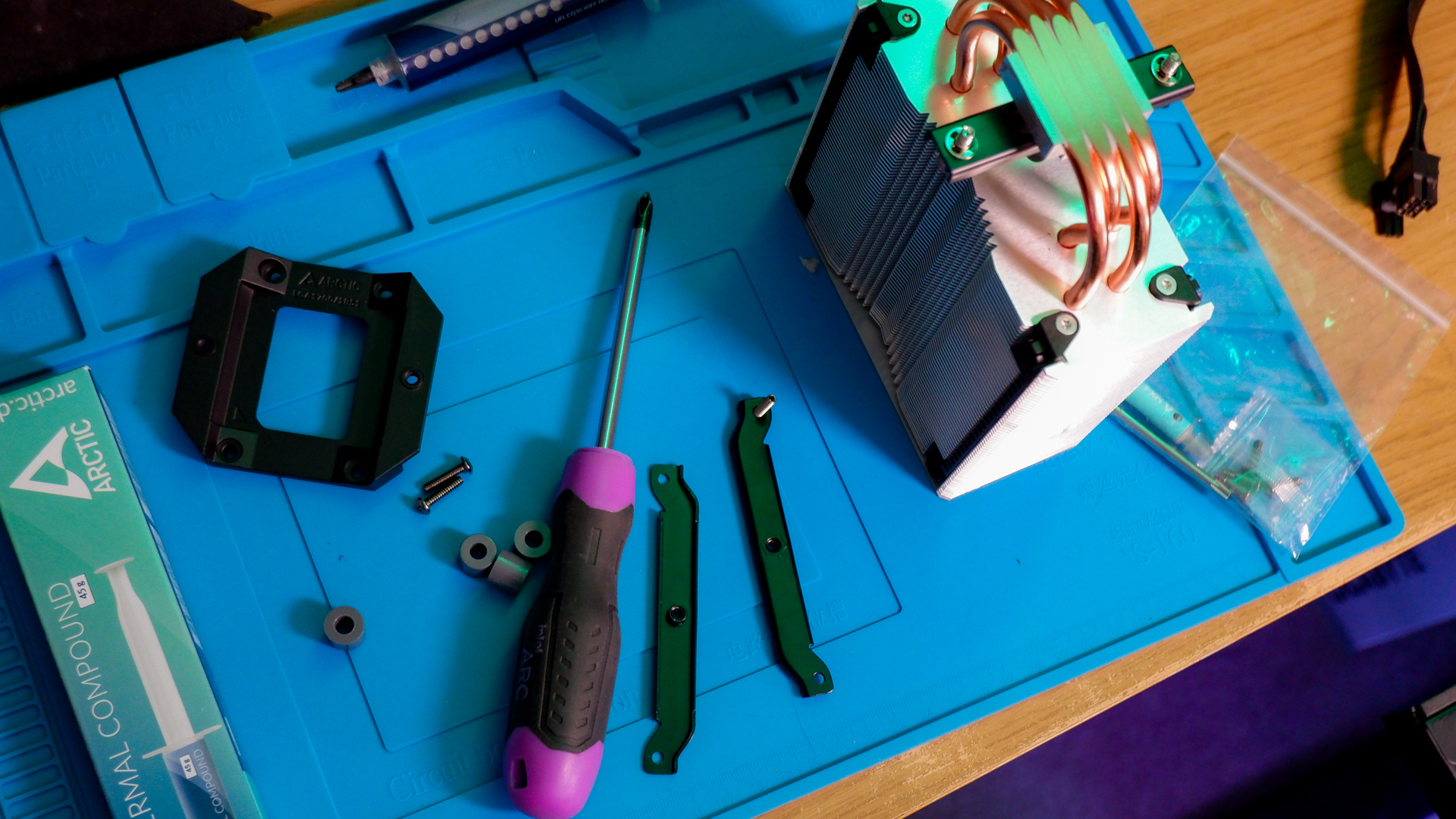
2. Arctic Freezer 36
Our expert review:
Specifications
Reasons to buy
Reasons to avoid
✅ You want to replace a stock cooler: There's no big reason to spend more than this on your air cooler. Not unless you're trying to keep an enthusiast-grade chip cool.
❌ You want to keep a Core i9/Core i7 under control: This cooler can deal with modern Core Ultra and Ryzen processors, but it's less able with power-hungry 13/14th Gen chips.
The best budget air cooler is the Arctic Freezer 36. There's not much more you could want in an air cooler than this—it delivers superb performance for a very low cost.
For the money, Arctic has generously included two fans on the Freezer 36. These P12 PWM PST fans aren't anything special but they're surprisingly quiet. Even with two of them at full speed, it's not an overly loud air cooler. These fans are held in place with specialised metal fittings, which make clipping them on and removing them a doddle.
We test with an Intel Core i7 14700K, which is not easygoing on any air cooler, though the Freezer really holds up well to the onslaught. You likely want one of the best liquid coolers, or at least the Noctua NH-D15 G2 above, for one of these high-end 14th/13th Gen chips. However, you can keep a Ryzen CPU cool under any conditions with the Freezer 36—in our testing, it only reached 72°C on a Ryzen 5 9600X even during the demanding X264 and Cinebench R23 benchmarks.
One of the more surprising inclusions on this budget air cooler is the contact frame. This is a metal block included in the box that goes around Intel processors to offer a more level mounting position for the cooler, and keeps the chip from bending over time. That's an issue with older Intel chips now, but even on the newer models it's nice to have the option at no extra cost for peace of mind.
The installation process is a little trickier on Intel builds for the inclusion of the contact frame, but if you're careful you won't break anything. Though you really do need to be careful, as you're exposing the motherboard socket, pins and all, to rogue thumbs or screwdriver tips. The install process is a breeze on AMD builds.
Already quite the budget champ, Arctic also includes a tiny tube of its MX-6 thermal paste in the box. Enough for an install or two, at the very least.
Altogether, you won't find many better deals than the Arctic Freezer 36 for keeping your CPU cool. It's affordable and fantastic. Cheaper coolers don't look cheap enough by comparison.
Read our full Arctic Freezer 36 review.
The best looking air cooler for CPUs
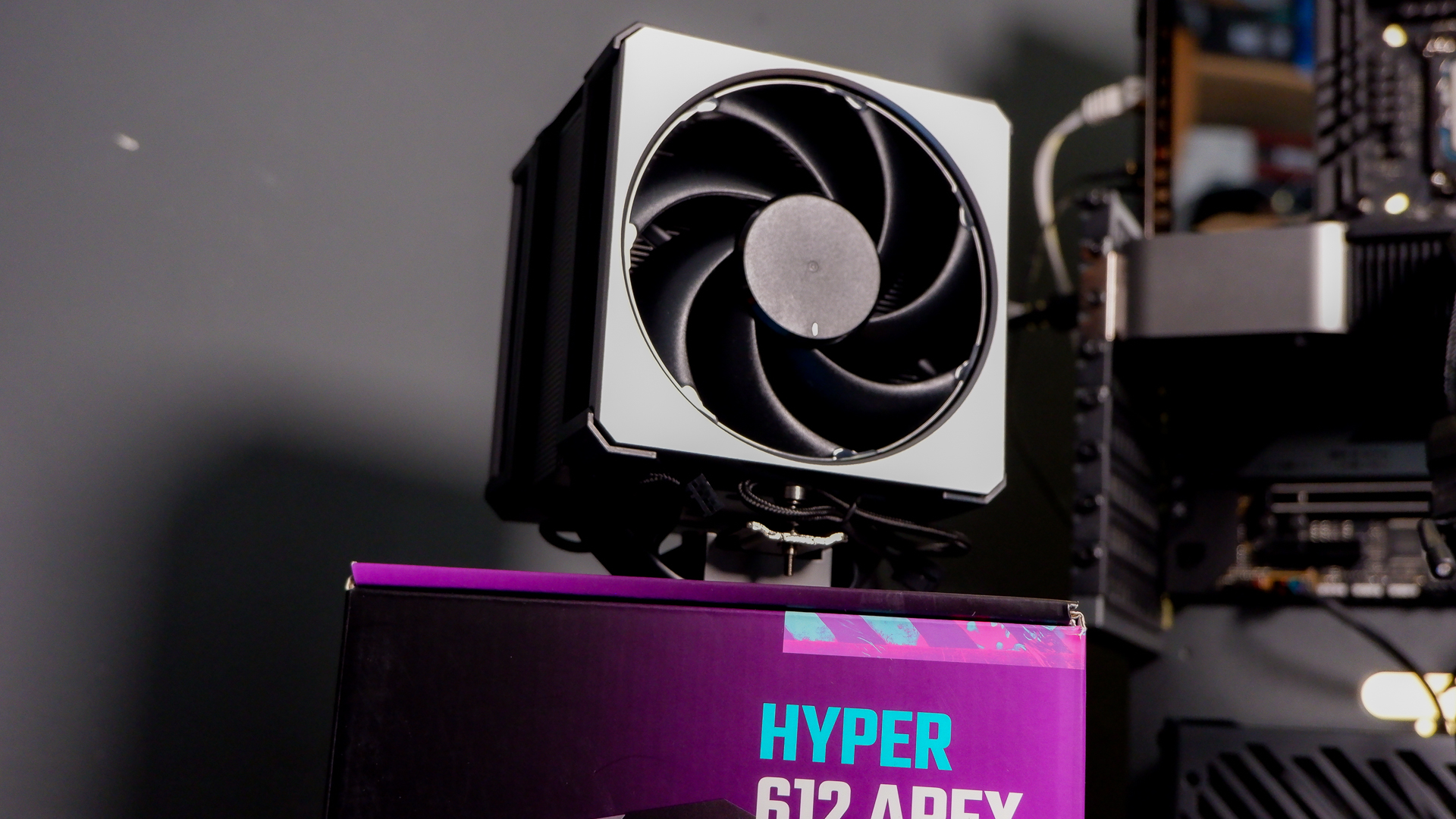
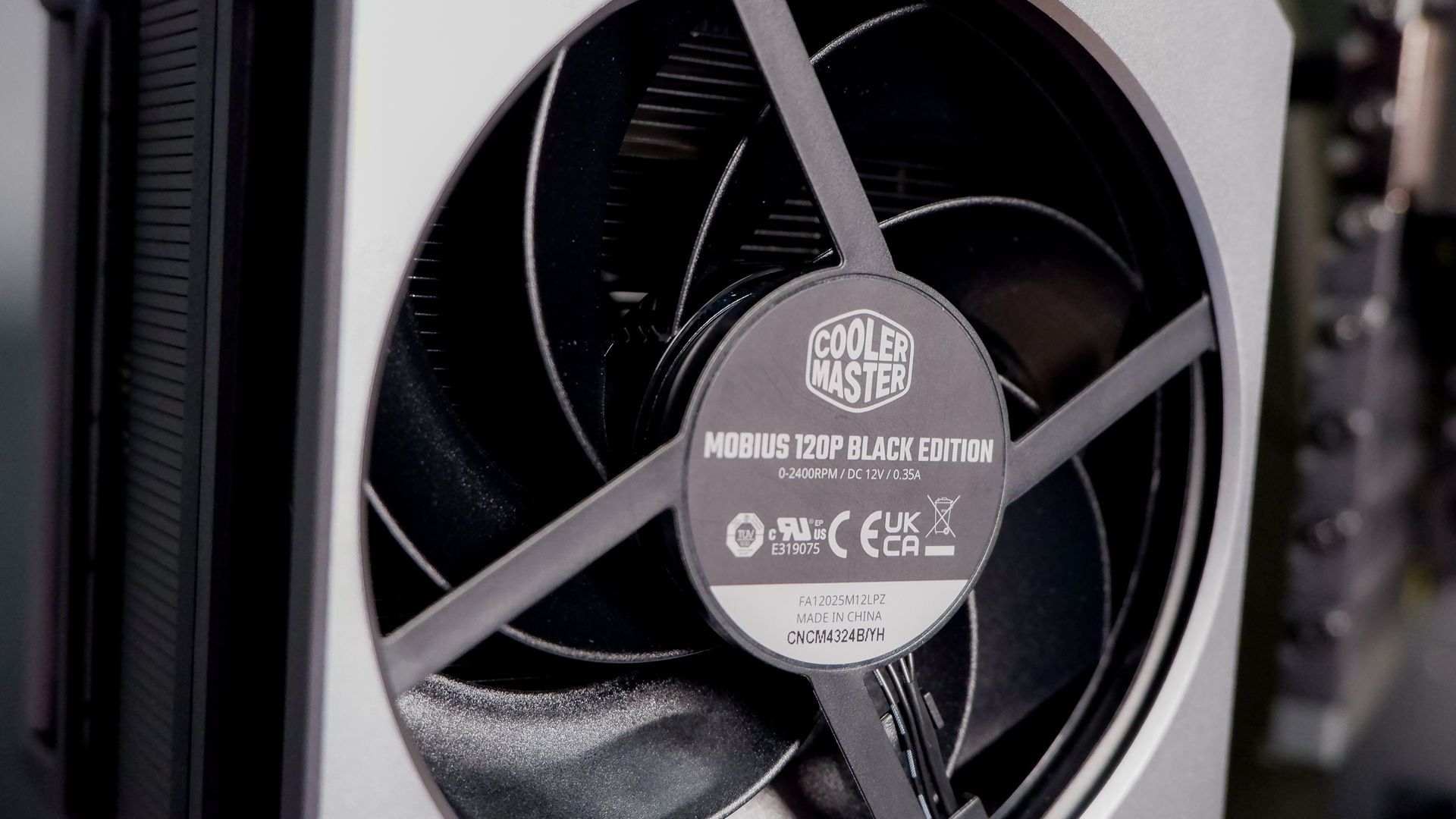
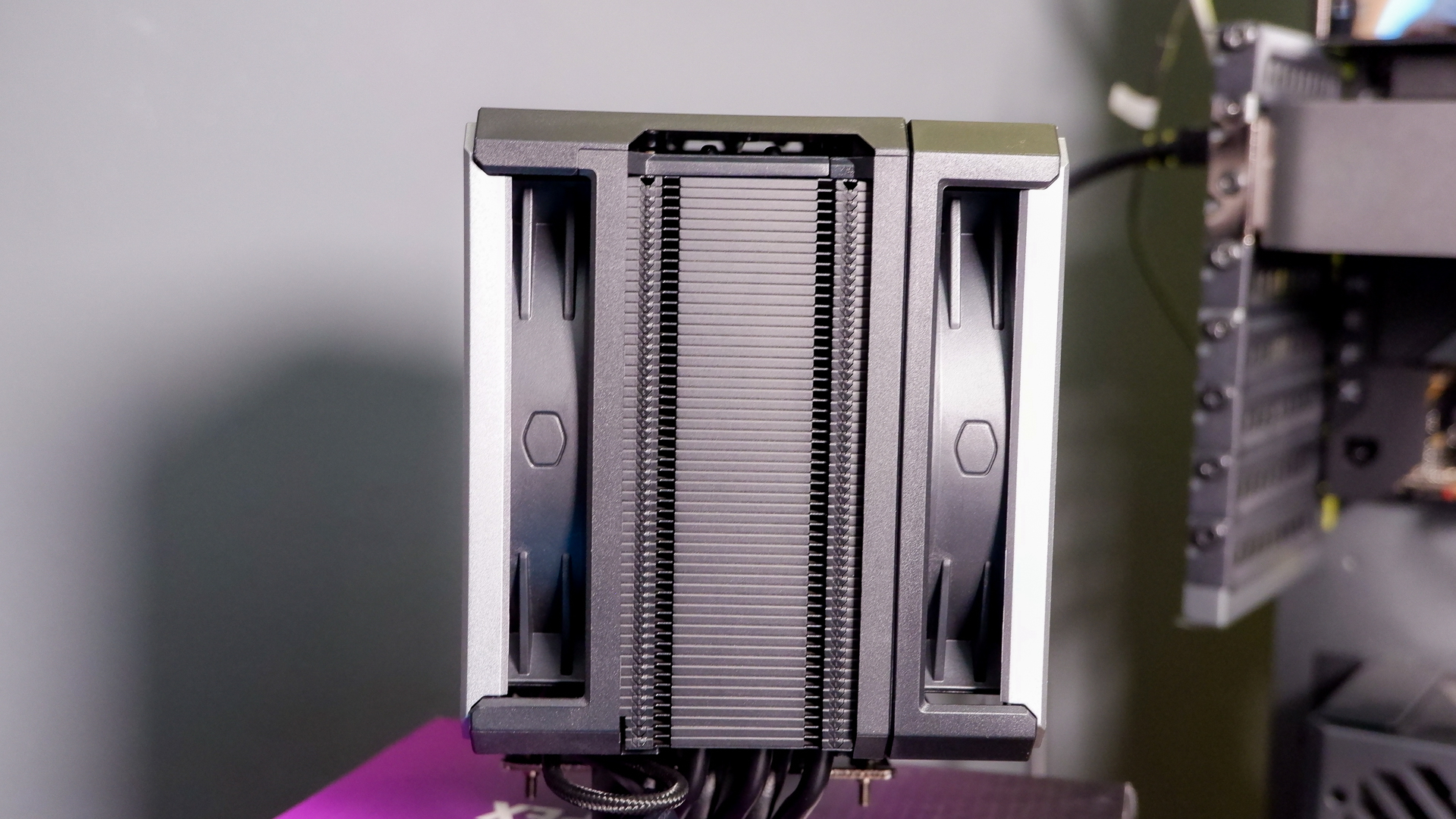
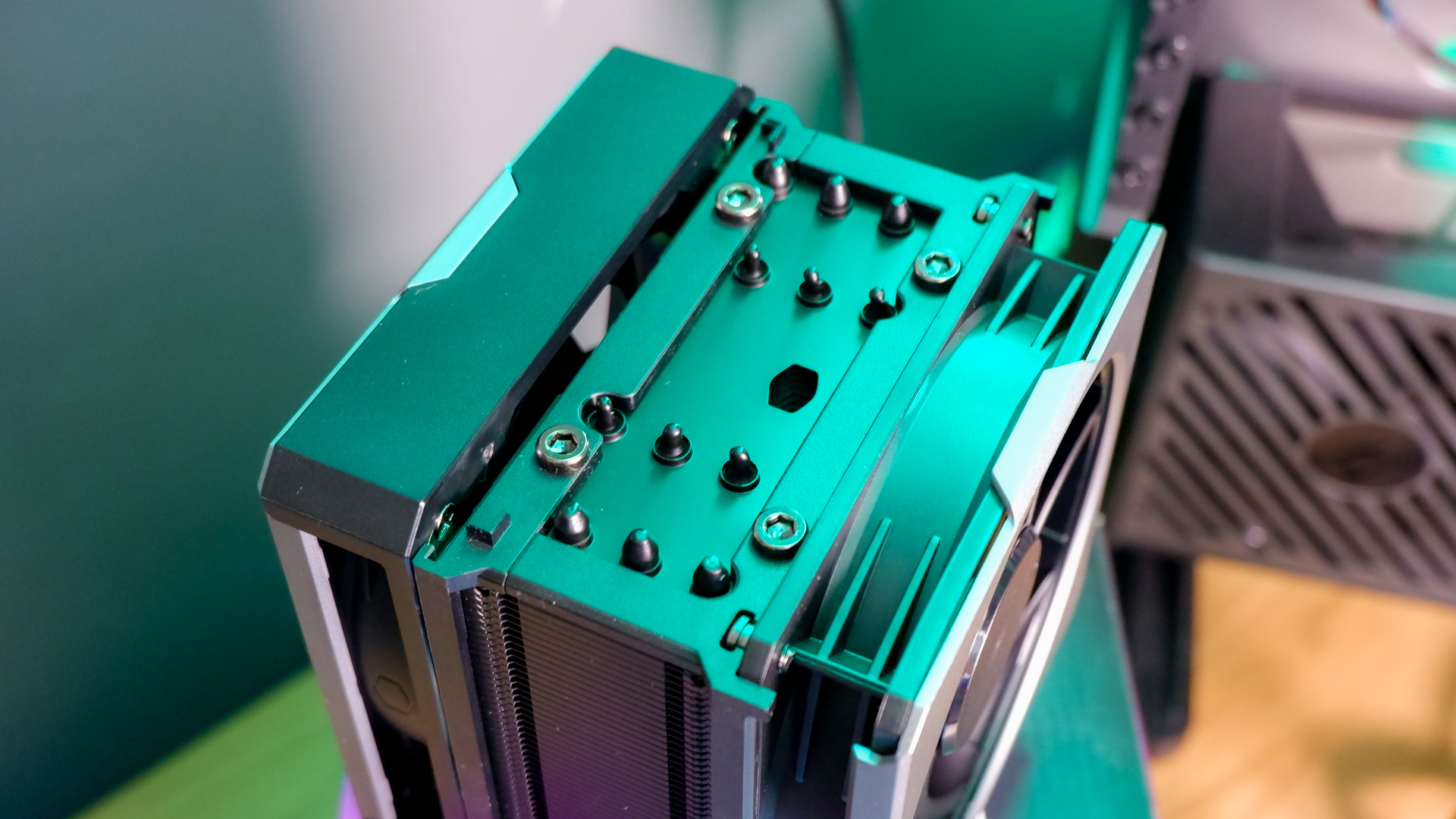
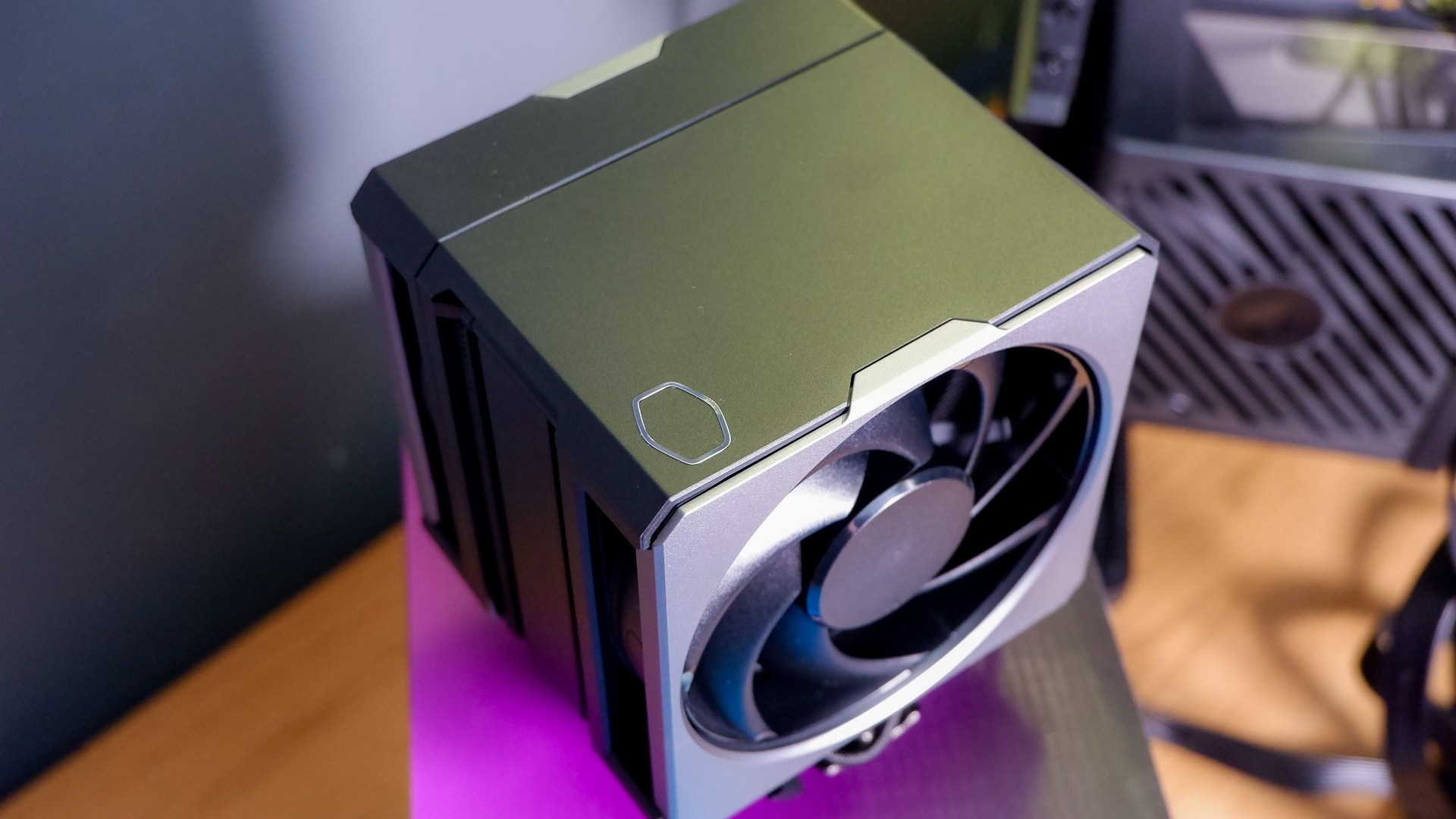
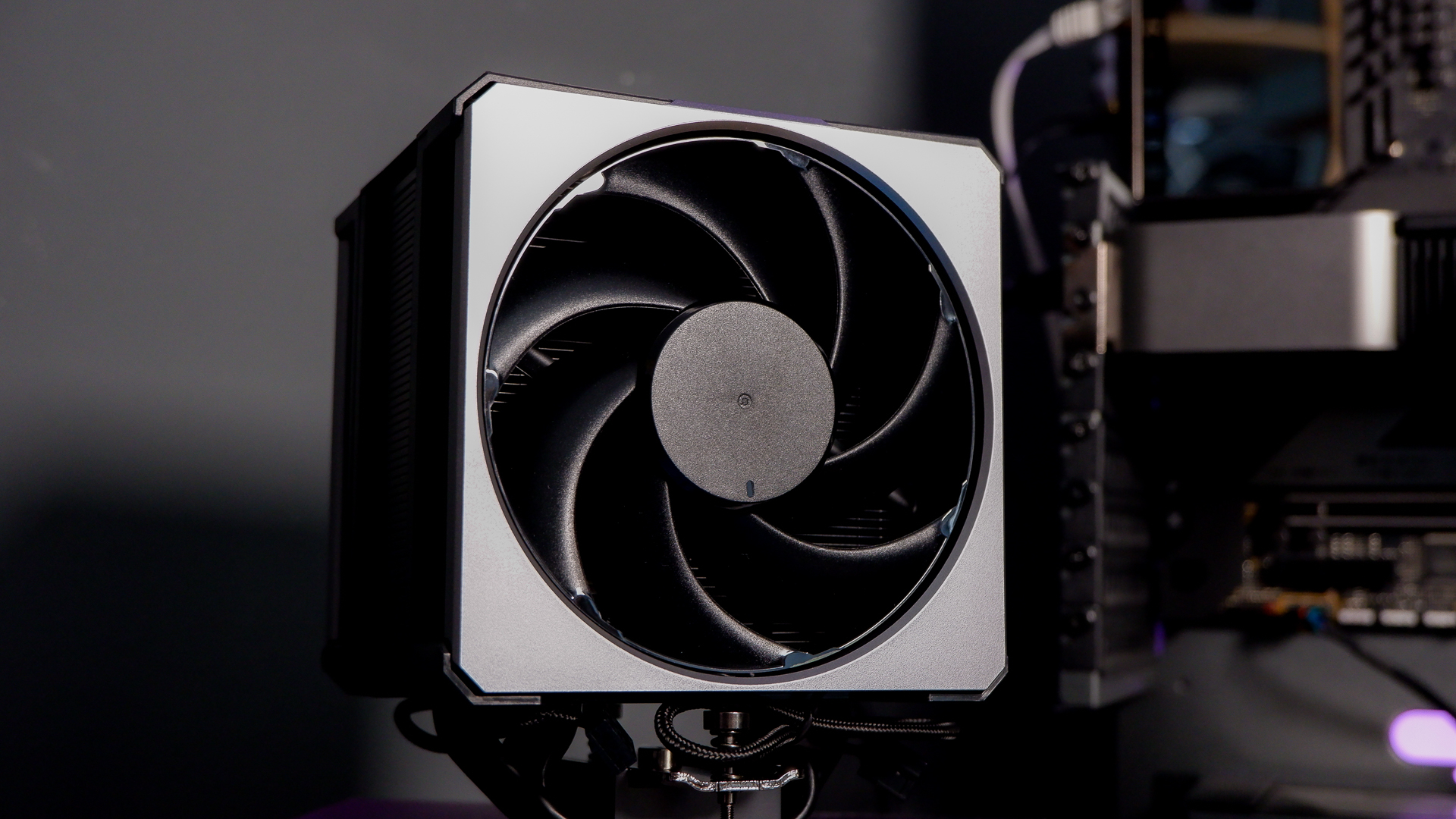
Specifications
Reasons to buy
Reasons to avoid
✅ You want a cooler to brag about: The Hyper 612 Apex looks like it should cost a whole lot more than it does.
❌ You just want performance: The Hyper 612 Apex is all about looks. If you want the best performance-per-dollar, buy a Freezer 36.
The best looking air cooler is the Cooler Master Hyper 612 Apex. It's hella boxy, ditching the usual bare heatsink we've become accostomed to looking at, but it looks good in just about any case with a window you throw it in.
Coming from a long line of very successful air coolers, most of all the Hyper 212, the 612 Apex takes things to a new level with fancy features you won't see on the budget models. These include fan rails, covers, and a magnetic top cover.
The rail system helps keep the installation process nice and simple. It has two Mobius 120P PWM fans, though they look a little different to the standard fans you'd pull off the shelf. They're plated with a sleek silver exterior and you don't need any tools to slide these on or off the cooler. You will need tools to fully dismantle and reinstall new fans on the unit, which might be a bit tricker than some, but if you're sticking with what's here, it's easy peasy.
The top plate is magnetic, too, which covers up any ugliness underneath and keeps the side of this cooler most likely to face a glass side panel on a case looking smart. You don't have to mount this cooler with the minimalist Cooler Master logo in the bottom right of the cooler, but I couldn't get it to fit any other way around with the Asus ROG Maximus Z790 Dark Hero I use for testing. There's no real overhang over the RAM sticks with this cooler mounted in this default position, at least, despite its big and blocky shape.
In regards to how competitive this cooler is, it delivers decent temperatures on par with many others in this guide with the Core i7 14700K in games. In demanding CPU tasks, it's a little overwhelmed—as all air coolers tend to be on this chip—but it does do much better with the TDP dropped to 120 W, as one might expect.
As for price, this is an expensive cooler at MSRP—$80 in the US—but the good news is that it never seems to sell for that. It's always going for less. In fact, I've spotted it going for only a little over $50, which is absolutely affordable enough to consider over a budget option. It is a little loud compared to some and you might not love the look as much as I do, but it's cool to see a company do something different in coolers for once. And from Cooler Master, no less.
Read our Cooler Master Hyper 612 Apex review.
The best quiet air cooler for CPUs
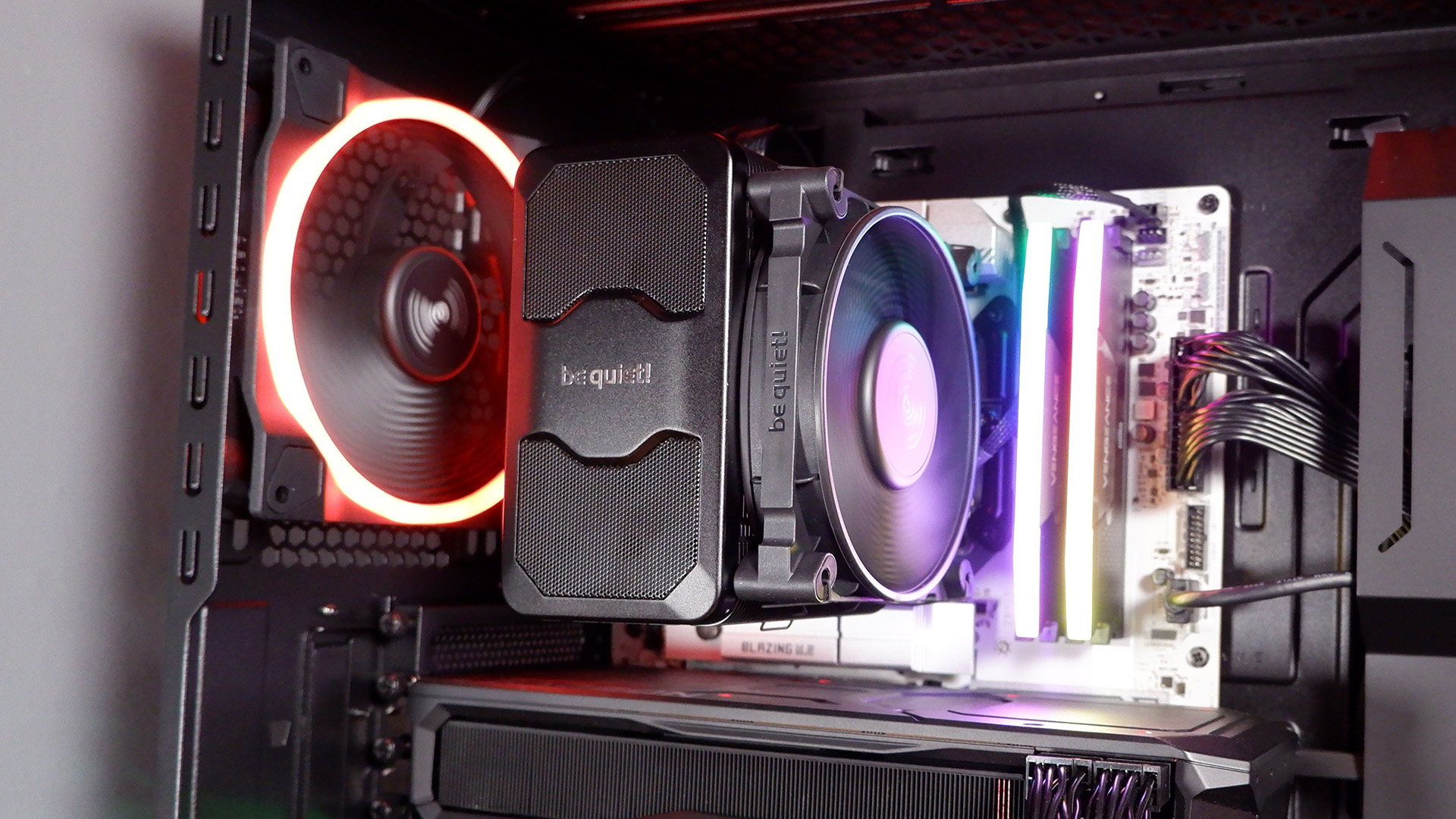






Specifications
Reasons to buy
Reasons to avoid
✅ You want an affordable yet stylish air cooler: This cooler looks great for the money, and it is still cheaper than most reasonably sized liquid coolers. It'll perform well with the right chip, too.
❌ You want to pair it with a power-hungry processor: This isn't the best air cooler for any sort of high wattage chip, such as the higher-end of Intel's 14th Gen. It's much better suited to AMD's Ryzen lineup and Intel's Core Ultra chips.
The best quiet air cooler is the Be Quiet! Dark Rock 5. That's the non-pro model, which comes with a single tower, single fan and at half the price of a Noctua NH-D15 G2.
The headline feature for the Dark Rock 5 is quiet operation. The included Silent Wings 4 fan is limited to 2,100 RPM, which is lower than some in the range, and keeps the noise levels low as a result. It's also made by a company called 'Be Quiet!', which says it all, really.
There's only one fan in the box to clip onto the single heatsink tower, which does limit the cooling potential of this cooler compared to a double-barrelled beast like the Noctua NH-D15 G2.
In our testing with an Intel Core i7 14700K (that's what we use to test all coolers), the cooler managed to keep a decent temperature in the 3DMark Steel Nomad stress test and multiple back-to-back runs of Metro Exodus Enhanced Edition. It only just managed to stave off triple-digit temperatures in CPU-intensive benchmarks, however, and we did see throttling occur in Cinebench R23 and X264..
Not only did we test this with Intel's power-hungry chip, however, I also used this as the centerpiece of a PC powered by Intel's Core Ultra 5 245K. This new generation, like AMD's chips, is much more power savvy. In this setting, the Dark Rock 5 performed really well. It topped out at 65°C while gaming and only reached 76°C under more intense load. Not bad at all.
The Dark Rock 5 has another thing going for it: it looks fantastic. There's a vanity plate that sits atop of the cooler to cover the screw holes and make it look a little nicer, and the all-black styling helps it fly under the radar in a build and not stand out like a sore thumb.
The mounting process is a little fiddly but it's not particularly difficult to get your head around. There are just a few plates, screws and brackets to get your head around.
Altogether, this is a great CPU cooler with lots of potential in the right sorta PC build.
Read our full Be Quiet! Dark Rock 5 review.
The best low-profile air cooler for CPUs
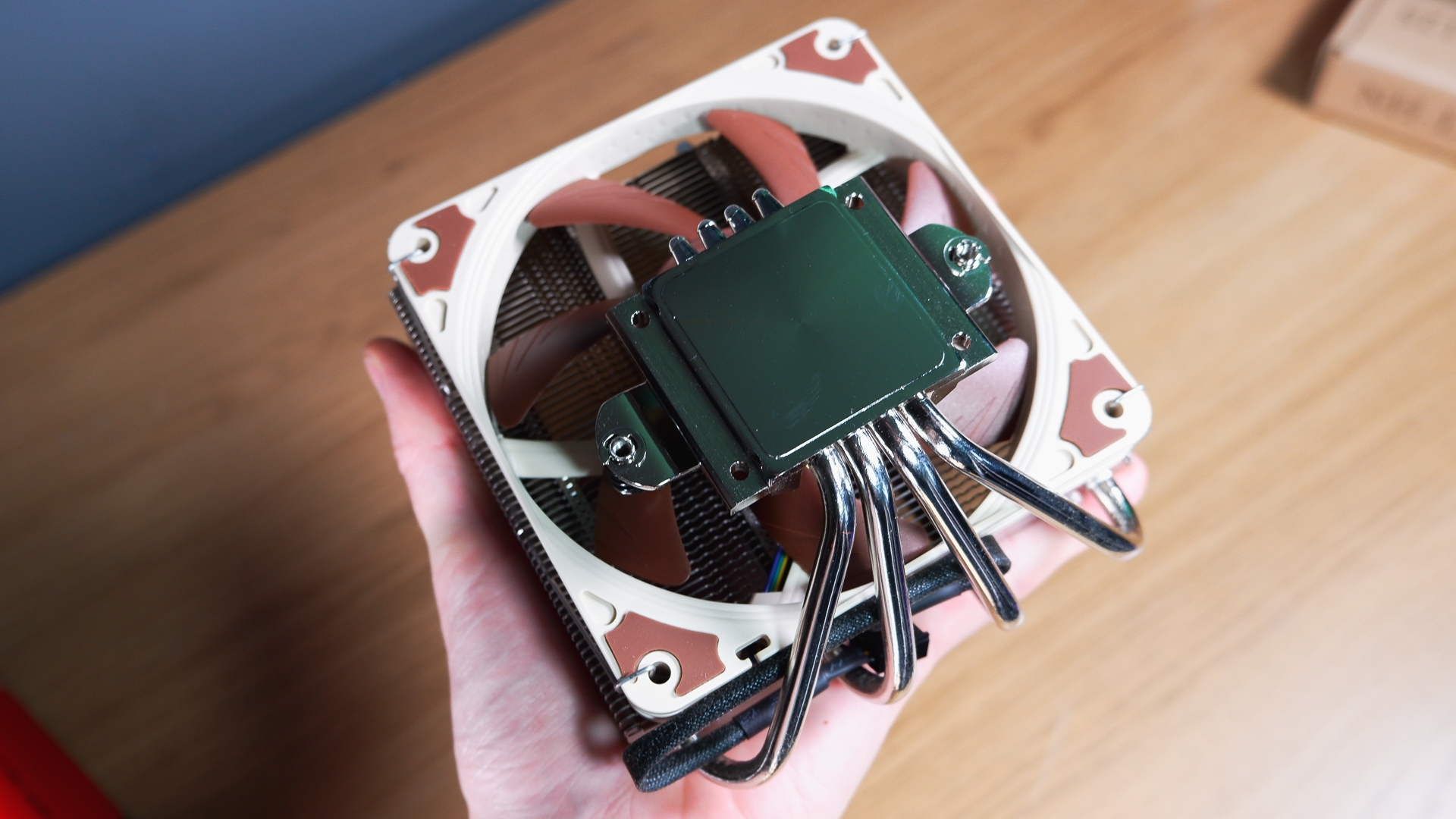
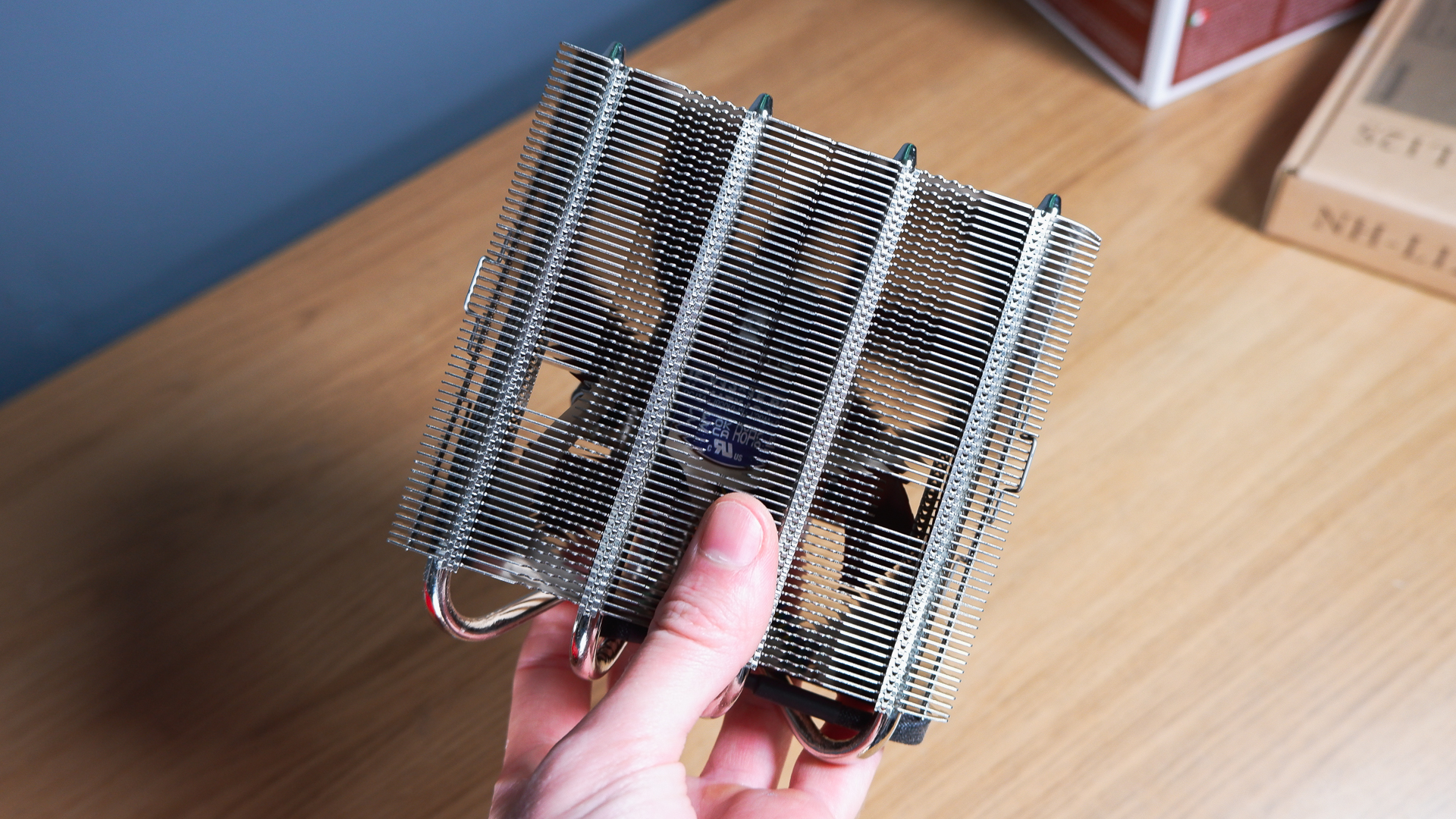
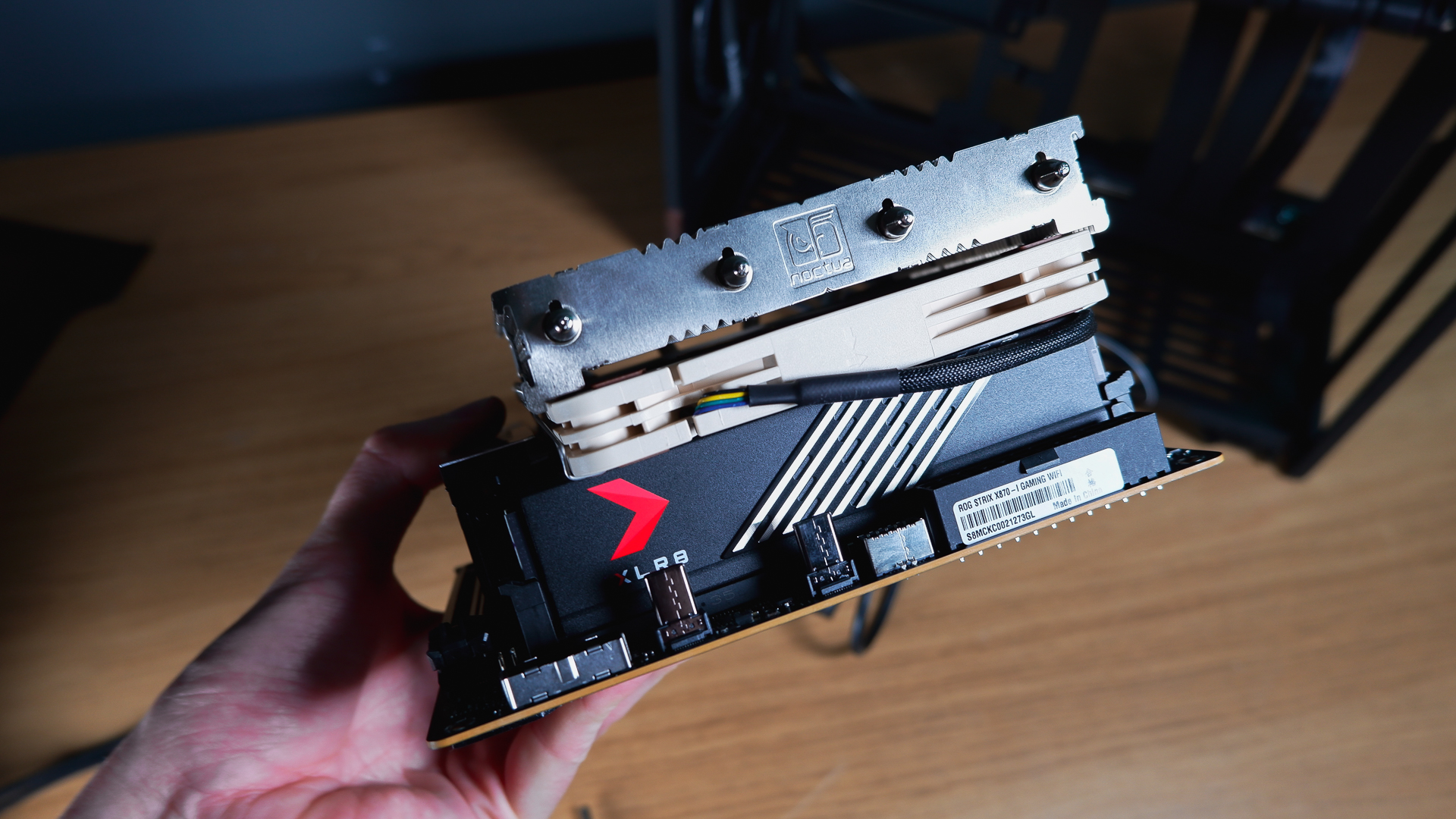
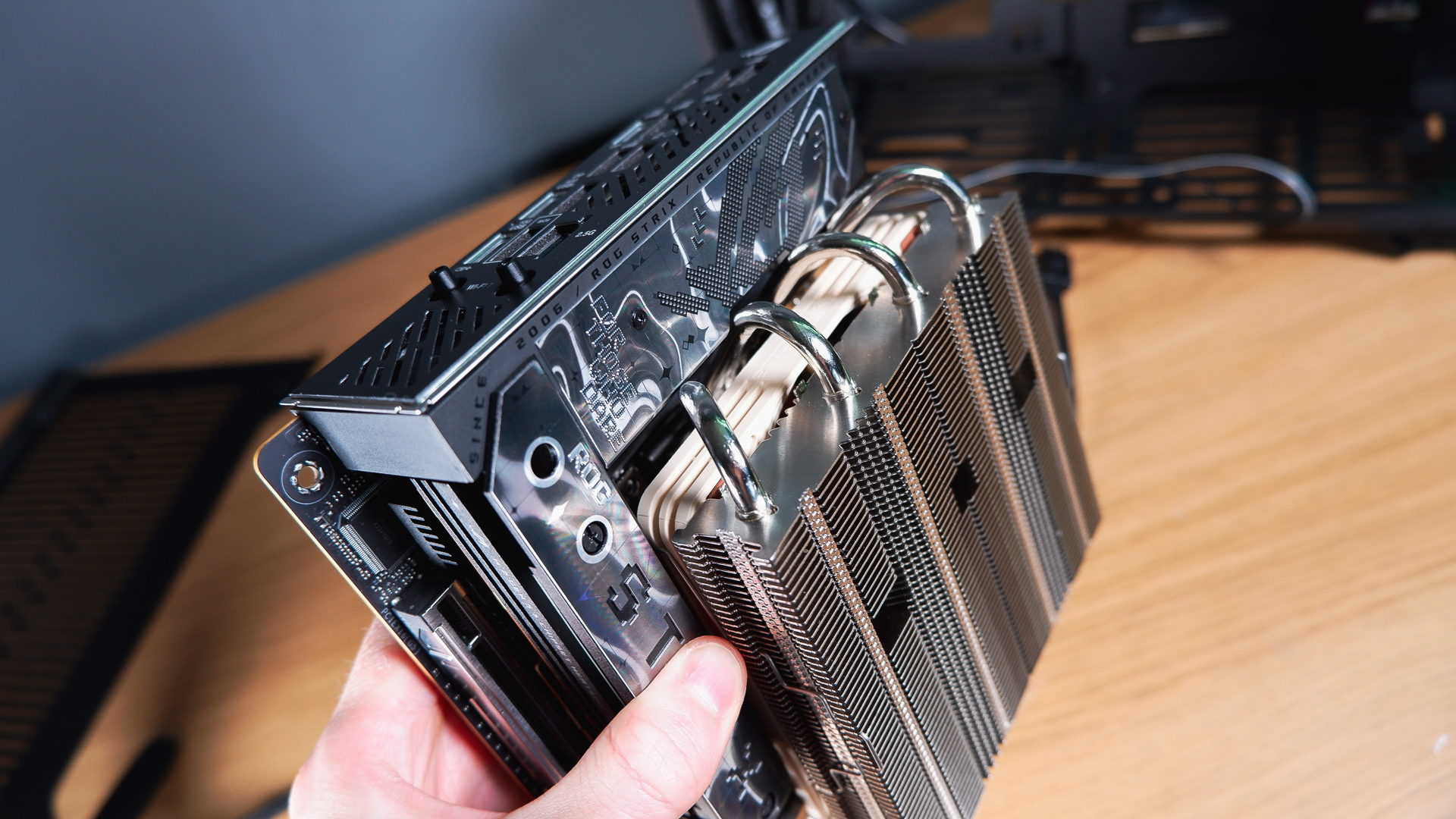
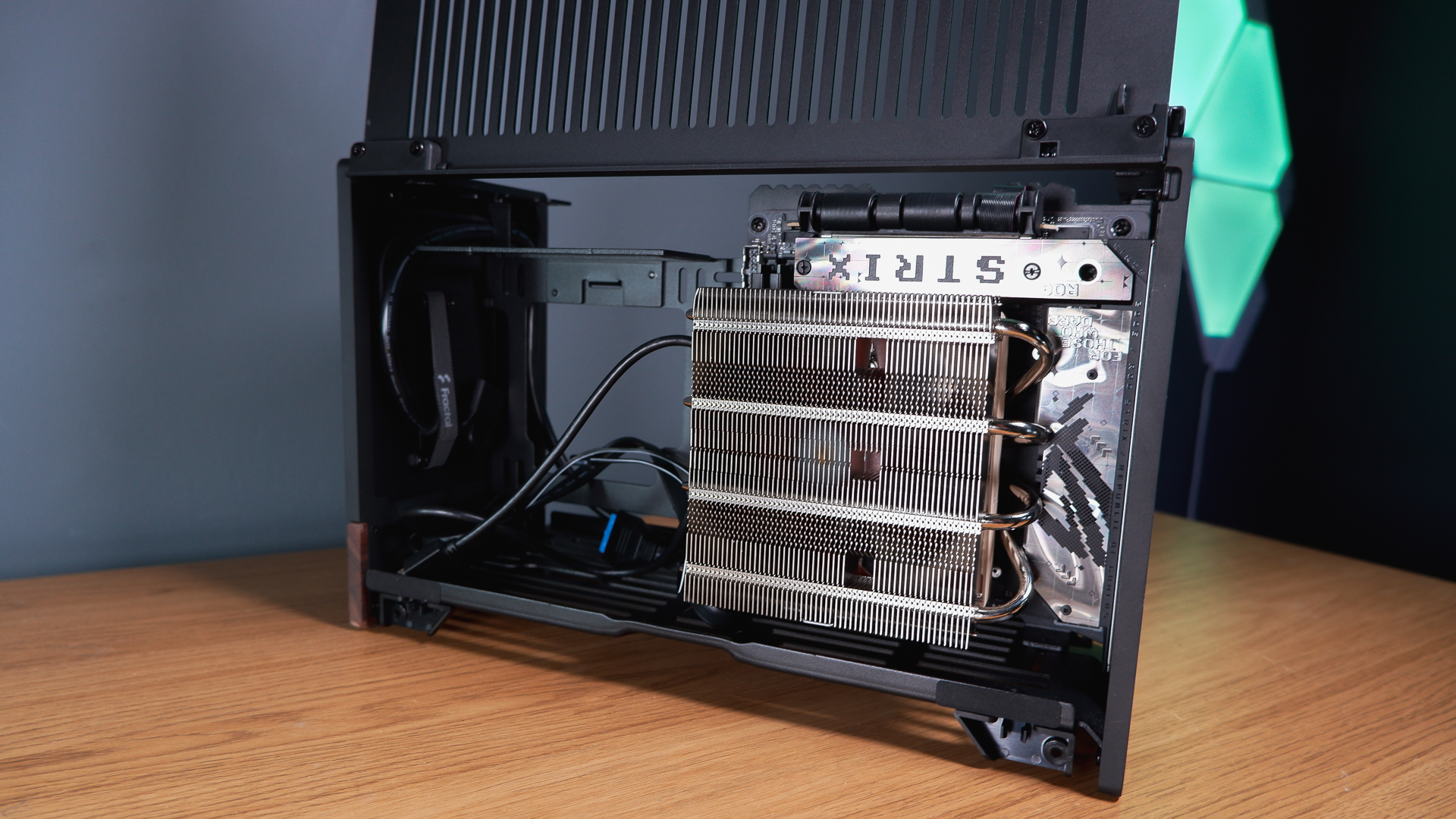
Specifications
Reasons to buy
Reasons to avoid
✅ You have limited space: This cooler packs into a tiny space, thanks to a fan that can be stuffed inside or outside the heatsink.
✅ You want a quiet option: Despite a smaller fan, which usually makes for a louder fan, this runs pretty quiet with a relatively low-power CPU.
❌ You have room for something a little bigger: Even a slim single-tower air cooler will outperform this. Unless you need the minimal footprint it offers, look elsewhere.
The best low-profile air cooler for CPUs is the Noctua NH-L12S. It's compact, capable, and gosh darn adorable.
Small form factor builds needn't be any more complicated than they have to be. Thankfully, the Noctua NH-L12S makes fitting an air cooler into a cramped space rather easy. As easy as it could be, anyways.
I say that with experience: I built my dream mini PC inside the Fractal Terra and I found it all surprisingly easy. Sure, I did have to reinstall the cooler once (only once!) due to some wishful thinking on my part, but it all fit in there rather snugly.
You can install the included Noctua NF-A12x15 PWM fan one of two ways: between the coldplate and heatsink or outside the heatsink. Either way works great, but if you have a compact case then you might want to try to fit the fan inside the cooler for maximum space savings. Once installed, the fan helps cool the chip and gets some airflow over your VRM, which is handy.
While you need to be aware of the dimensions of this cooler (70 x 128 x 146 mm), your motherboard, and your case, most should leave plenty of room for this cooler to sit. That said, I did have to push down a little more than I'd like to get the cooler fitted to the Asus ROG Strix X870-I Gaming WiFi.
As for performance, my mini PC paired this cooler with a very sensible AMD Ryzen 7 9700X, a 65 W CPU. This chip hit 70°C on average during gaming, and a maximum of 76°C. Even when I hammered the chip with Cinebench and other demanding workloads it only hit 79°C. That's super impressive.
Though we use a Core i7 14700K for our cooler testbench. This is not a sensible chip, thanks to a 125 W base power. Surprisingly, however, the LH-12S dealt with this better than expected. I expected it to constantly thermal throttle, and actually it only thermal throttled during Cinebench R23 and X264—two intensive workloads. In gaming, however, it only hit 86°C.
Ultimately, I wouldn't recommend one of Intel's most power-thirsty processors for a small form factor PC. Stick with AMD, or even Arrow Lake, I guess. Though I will recommend the NH-L12S—it's a great cooler.
Read our full Noctua NH-L12S review.
The best passive air cooler for CPUs
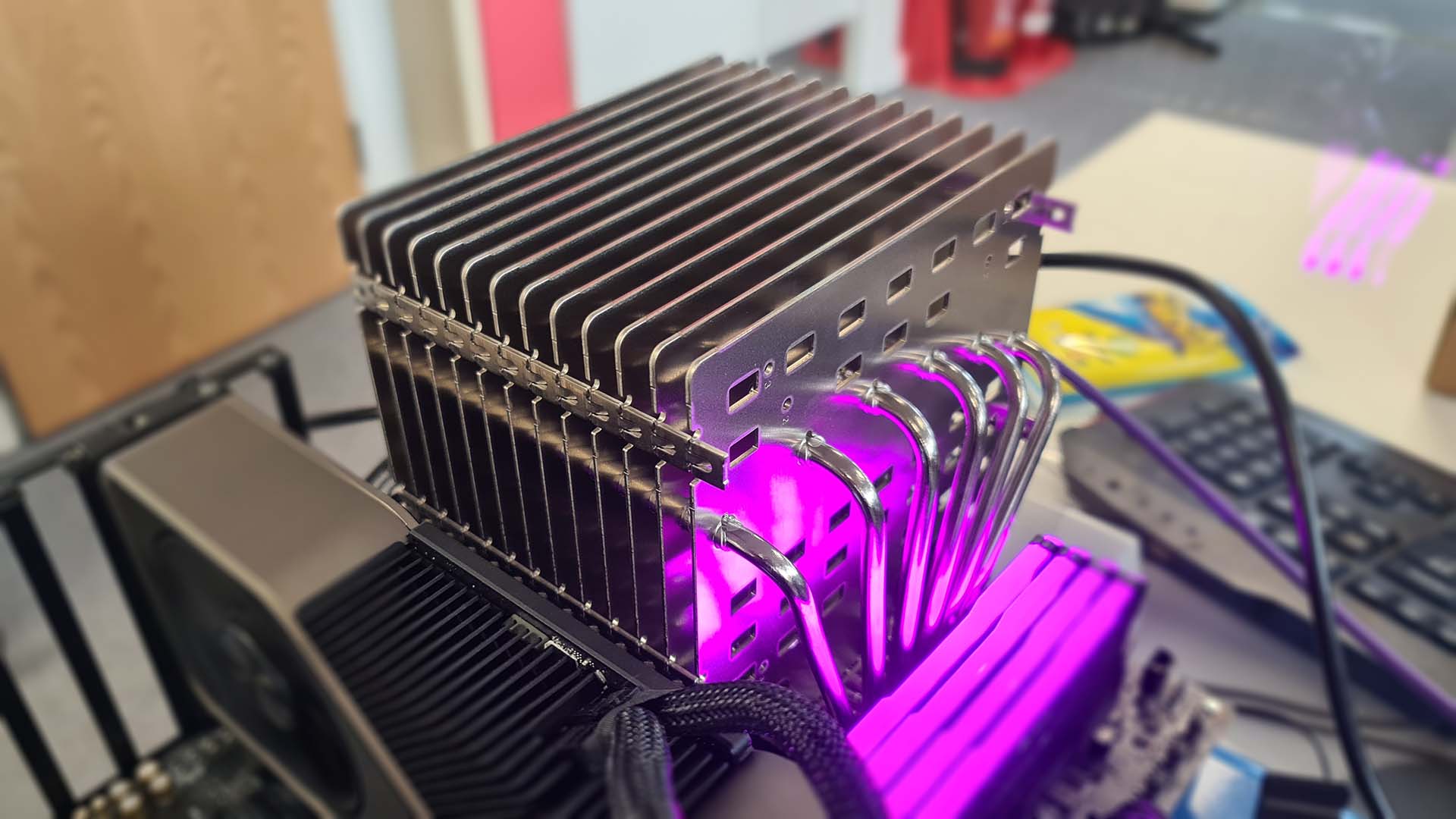
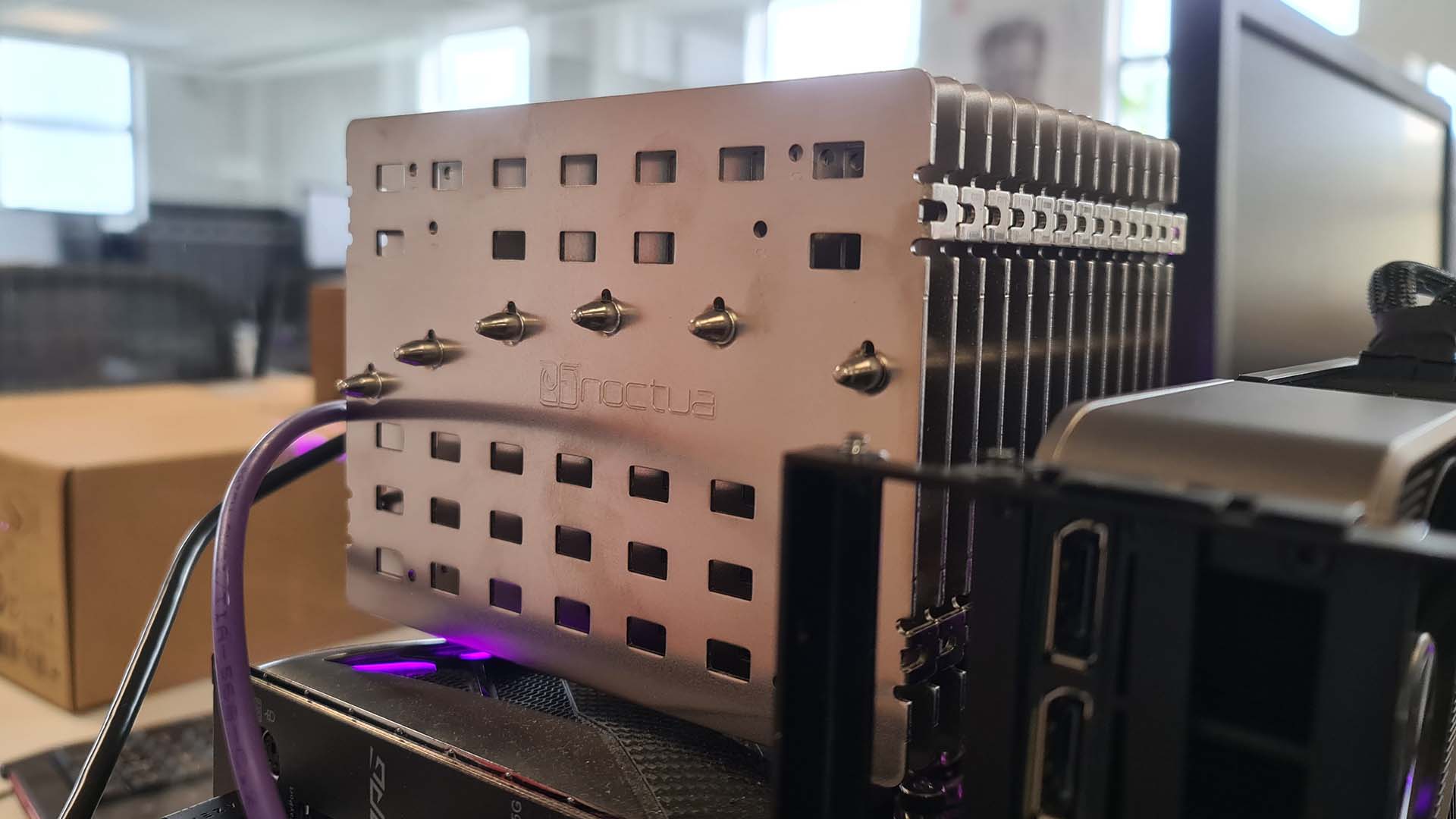
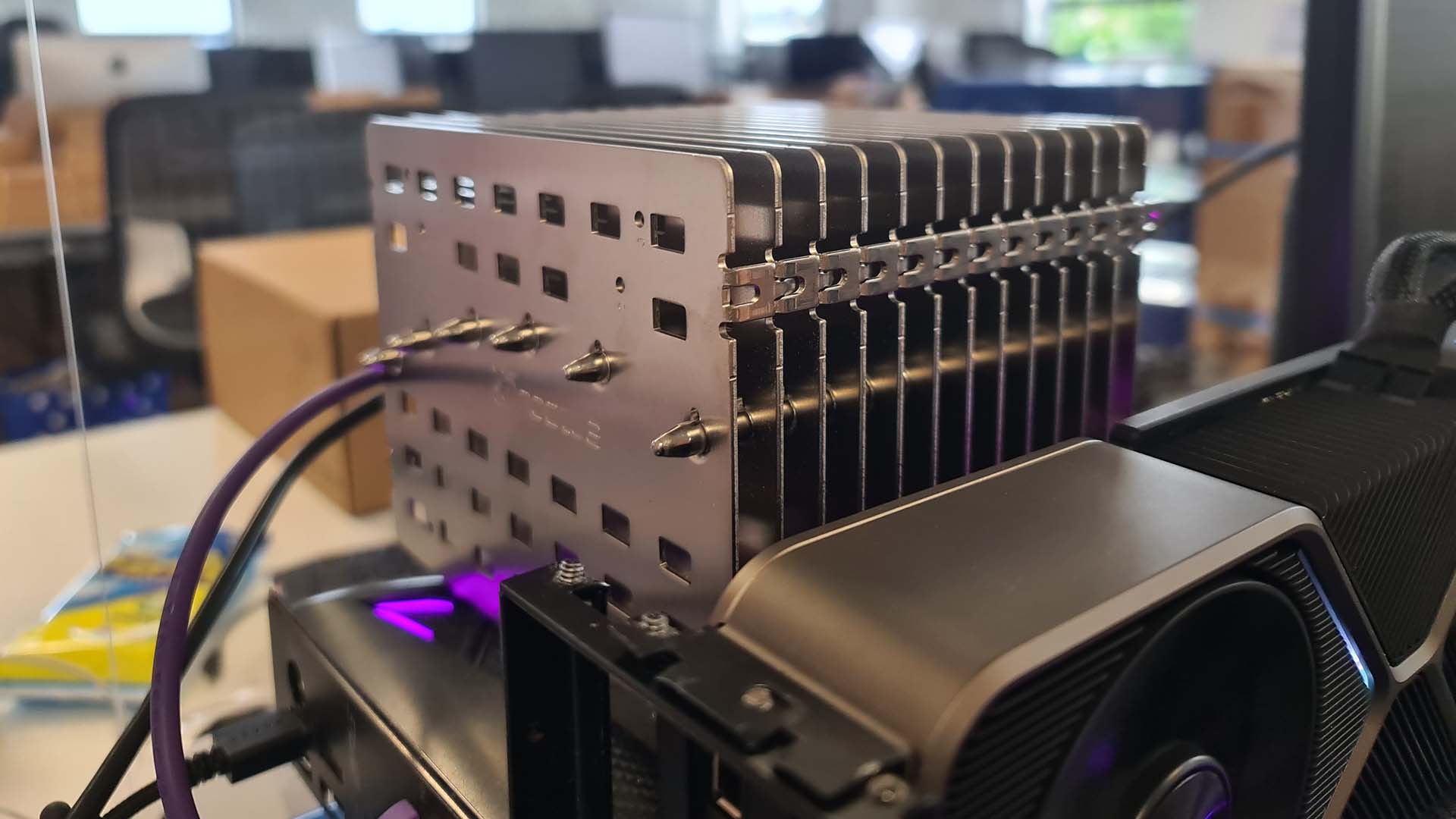
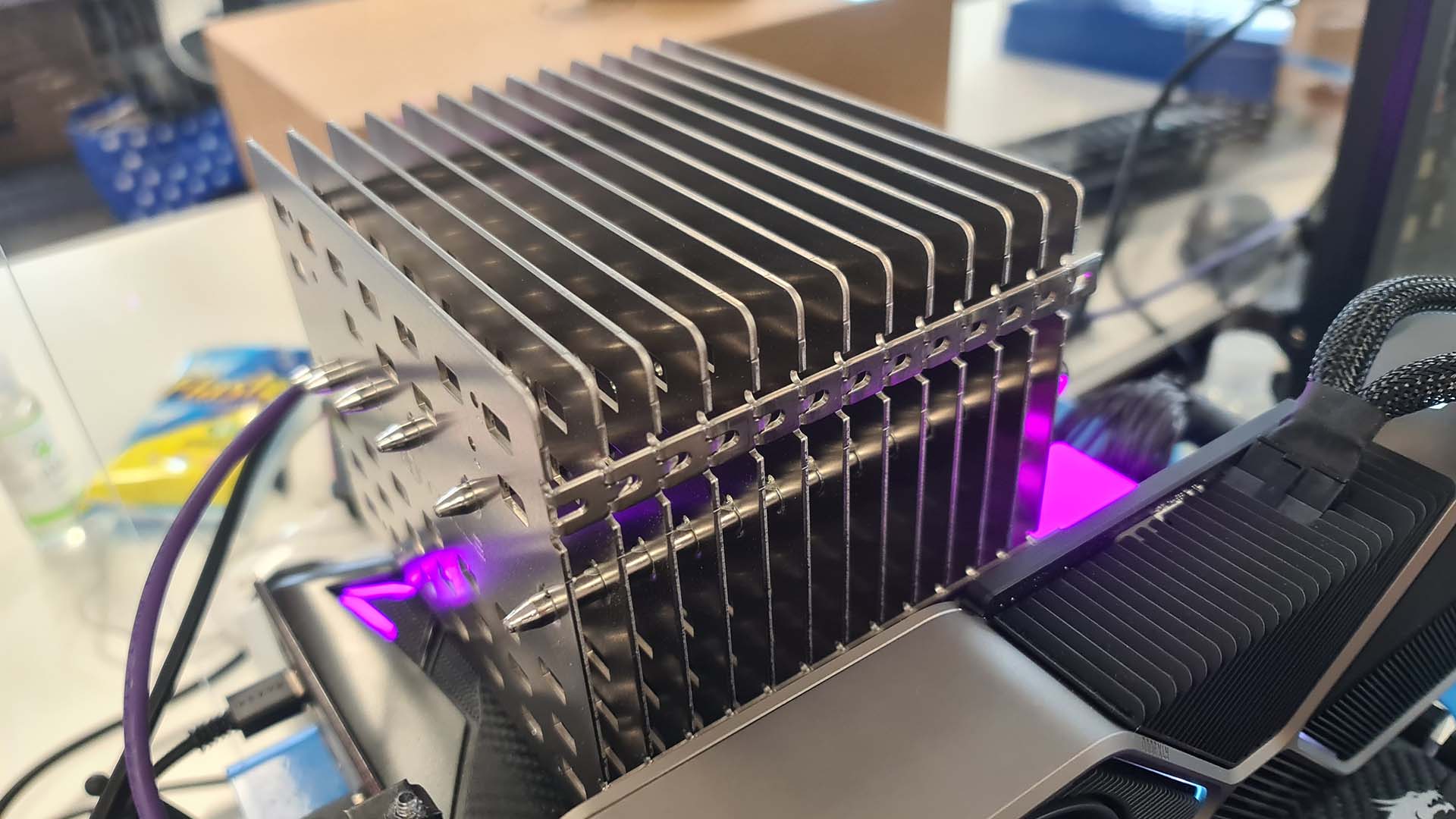
Specifications
Reasons to buy
Reasons to avoid
✅ You want complete silence: With the NH-P1, you can build a completely silent PC. It won't be powerful, but it will be inaudible bliss.
❌ You're going to stick a fan on it: If you need a chiller for a high-end CPU, don't use a passive cooler. Sure, you can add a fan to it, but then it's an expensive alternative to the NH-D15 G2.
Noctua’s NH-P1 is the best passive air cooler for CPUs because 1) it does the job extremely well 2) it's one of very few that tries. Today's powerful processors demand large amounts of cooling and few manufacturers feel up to the task of designing a cooler to do that without any fans whatsoever. It's a big ask.
Noctua, famed for its beige and brown fans and cooling products, is one such company. And the NH-P1 is a product that many have been waiting for for a long time.
The NH-P1 is expensive, bulky, and generally limited to CPUs in the 65W range—even lower if you run it without any fans around. Sounds like a dud? Hell no. Its appeal may be limited, but if you're a user who values silence above anything else, then the NH-P1 will be exactly what you're looking for.
The NH-P1 uses only natural convection to keep a top chip cool. The good news is that even some pretty powerful AMD Ryzen CPUs are within its grasp.
The NH-P1 differs from your average chip chiller in design. There are fewer fins to its heatsink, which might seem counterintuitive, but they're much thicker. It features a grid of cut-outs horizontally through the cooler design, which helps air flow naturally across the cooler and, importantly, sap away the heat transferred into the fins from the heatpipes.
The heatpipes are of major importance here. Sit the NH-P1 side-by-side with the NH-D15 G2 noted above, and you'll notice they're oriented differently. The heat pipes are actually the longest along their horizontal axis, which impacts heat dispersion due to the reliance on gravity for a heat pipe to function.
While It does work without any fans around, it can retain heat without some active airflow, reducing its cooling efficiency. That's hardly a surprise, the rest of these air coolers don't come with fans just for the thrill of it. It does much better with at least a case fan or two blowing around it, even if from a distance.
You can also pair it up with a directly attached fan, though that's a bit of a weird move. Just buy a NH-D15 G2 and save yourself the hassle in that case.
The NH-P1 is built for a specific purpose. It's niche, no doubt about that, but fans of quiet computing will love it. If you sleep near your PC or run a lounge room media center, the NH-P1 will ensure that your PC is truly silent. It's just not meant for everyone, or every CPU.
Read our full Noctua NH-P1 review.
Also tested
Endorfy Fortis 5 Dual Fan
The Fortis 5 is great value for money. In fact, it probably would be in this guide if it wasn't for the fact the Arctic Freezer 36 is better. It's not quite as easy to use as the Arctic.
Read our full Endorfy Fortis 5 Dual Fan review.
Cooler Master Hyper 212 Pro
Another budget air cooler that's lost to the ether thanks to the excellent Arctic Freezer 36. The Hyper 212 is affordable but just not affordable enough for a look-in.
How we test air coolers
We put all of the air coolers we review through a benchmarking suite designed to inform us about the limitations of any given cooler. We take the average and maximum CPU temperature across various stress tests, which we run for extended periods. These include:
- Baldur's Gate 3—5-minute gameplay test
- x264
- Metro Exodus Enhanced Edition benchmark—5 run loop
- Cinebench R23—10-minute multi-threaded test
- Low TDP test—14700K at 120 W PL1 + PL2
We also measure the time it takes for the processor to return to idle temperature following a run of the CPU-intensive benchmark, Cinebench R23. This offers a guage of the cooler's ability to move heat away from the processor and to the heatsink.
Finally, we record the noise produced by the fan(s) at 100% speed.
Frequently asked questions
Which is better, an AIO liquid or air cooler?
Anyone looking at picking a cooler for their rig asks this question: Air or liquid cooling?
Liquid cooling tends to be viewed as the premium solution, but air cooling remains perfectly viable unless you’re into heavy overclocking with higher core count CPUs.
Since the latest generation of processors from both AMD and Intel tend to be easier on power than the previous lot, you can get more mileage out of an air cooler today. Intel's 14th Gen basically demanded a large liquid cooler, but that's no longer the case. That said, a liquid cooler is still likely the best option for a high-end gaming PC with one of today's top chips.
Air coolers are generally cheaper, more reliable and simpler. Yes, they can be bulky relative to an AIO but radiators are also bulky and require large cases too. With air coolers you don’t have to worry about the (admittedly very small) possibility of leaks or pump failure. Noise levels are highly dependent on the fans used but if you choose wisely, there’s no reason an air cooler won’t be as quiet or even quieter than an AIO due to the lack of pump whir.
Are CPU air coolers effective?
A high TDP processor or CPU overclocking will require something big to absorb and dissipate all that heat. But a dual tower or dual fan model will be as capable of cooling as some all-in-one liquid coolers are.
If you want something quiet, a big cooler with a high cooling capacity will also suit, but pay attention to the noise levels and RPM rating of its fans. Then you get into things like your case size. You’ll need to go with a more compact cooler if you're running a mini system, so look at the dimensions.
There's also an argument to be made for downward blowers. The components around your CPU, such as the power circuitry and NVMe SSDs, can get hot and throttle if they're not properly cooled. And with a liquid cooler they get no help, not unless your AIO comes with a compact fan on the coldplate. A good downward blowing CPU air cooler will not just chill your processor, but other parts on the motherboard too.
How do I pick a CPU air cooler?
There’s so much to consider. It would be easy to simply go for the biggest one you can get, but that ignores case constraints, the TDP of your processor, your budget, and aesthetics. At least you can rest assured that our picks will serve you well with the appropriate accompanying hardware.
The best cooler is one that you can install in your particular rig, give it a stress test under a high heat load, tune the fan curves if necessary and then forget about it.
RGB models excepted, a good quality air cooler is unseen and never draws attention. You know you’ve made a good choice when you’ve gone months happily gaming away or doing whatever it is you do on your system with barely a thought about your cooling.
Keep up to date with the most important stories and the best deals, as picked by the PC Gamer team.

Jacob earned his first byline writing for his own tech blog. From there, he graduated to professionally breaking things as hardware writer at PCGamesN, and would go on to run the team as hardware editor. He joined PC Gamer's top staff as senior hardware editor before becoming managing editor of the hardware team, and you'll now find him reporting on the latest developments in the technology and gaming industries and testing the newest PC components.
- Antony LeatherContributor
